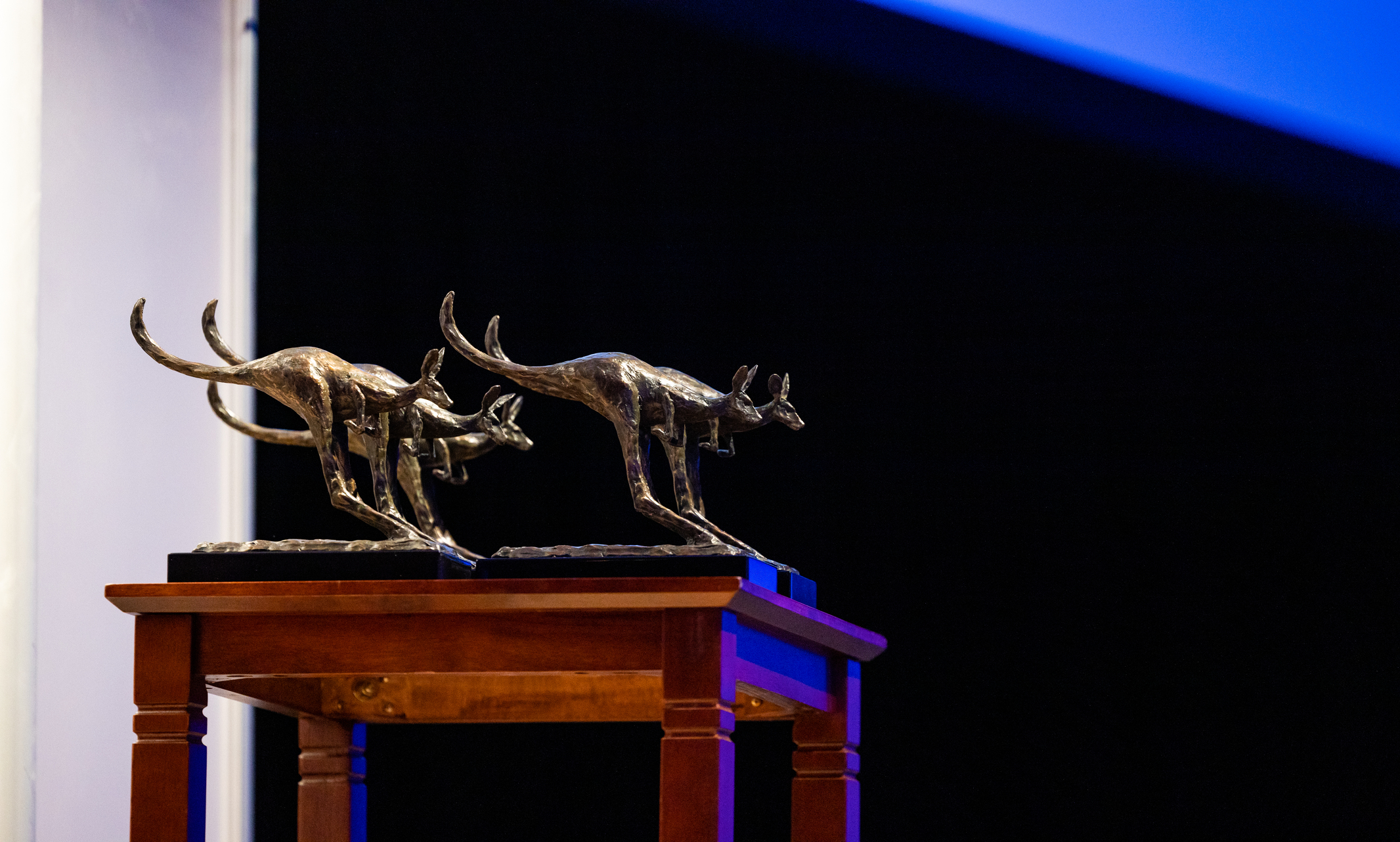
Sixteen alumni and one family were honored at the April event
The University of Missouri-Kansas City Class of 2022 Alumni Achievement Award recipients included the founder of a veterans housing program, a judge, a national CEO and a legacy family whose education and contributions to UMKC have spanned generations.
Sixteen alumni and one family were honored on April 29 at the James C. Olson Performing Arts Center. This year’s event was back in-person after the pandemic kept the last two year’s ceremonies virtual.
The Alumni Awards ceremony is one of the university’s largest events to support student scholarships. In the last decade, the Alumni Awards event has garnered more than $1 million in scholarships and immediate student aid for UMKC.
“When our alumni return to campus, it is always an exciting reunion. Whether the faces we see are familiar or not, we share the connection of walking the same halls, developing similar goals and being united as UMKC Roos,” said Chancellor Mauli Agrawal.
The night’s biggest honor, Alumnus of the Year, went to Bryan Meyer (B.A. ’11, M.P.A. ’15, J.D.’15), co-founder of the Veterans Community Project. Located at 89th and Troost in Kansas City, the Veterans Project is an innovative non-profit that provides housing for homeless veterans in tiny home villages.
“UMKC consistently reminded me there is always more to learn. For example, when I was pursuing my Masters, I took a class in leadership. I served five years in the Marine Corps and led other Marines in two different combat deployments – so I attended class confident there wasn’t anything I could learn on leadership from a classroom. I was wrong,” Meyer said. “I know the knowledge gained from my M.P.A. and law degree have been instrumental in my ability to provide a benefit to my community.”
Complete list of awardees:
Alumnus of the Year: Bryan Meyer (B.A. ’11, M.P.A ’15, J.D. ’15)
Spotlight Award: Riddhiman Das (B.S. ’12, M.S. ’19)
The Bill French Alumni Service Award: Ann Mesle (J.D. ’72)
Defying the Odds Award: Susan B. Wilson, Ph.D. (MBA ’05)
Legacy Award: North/Cheadle Family
College of Arts and Sciences: Melissa Zarda (B.A. ’02, M.A. ’07)
School of Biological and Chemical Sciences: Joseph Lambing (Ph.D. ’90)
Henry W. Bloch School of Management: Mike Perry (B.B.A ’89)
School of Computing and Engineering: Jungwoo Ryoo (B.S. ’96, M.S. ’98)
Conservatory: Xi Wang (M.M. ’03)
School of Dentistry: Brenda Bohaty (Ph.D. ’09)
School of Dentistry–Dental Hygiene: Jo Ann Weatherwax (B.S.D.H ’06, M.S. ’12)
School of Education: Lucero Garibay (M.A. ’16)
School of Law: J. Kent Emison (J.D. ’81)
School of Medicine: Lucky Chopra (B.A. ’91, M.D. ’92)
School of Nursing and Health Studies: Leslie Luke (M.S.N. ’00)
School of Pharmacy: Janelle Sabo (Pharm.D. ’00)
Co-chairs for this year's event were Joseph Spalitoo (B.S. '68, D.D.S. '72), president of the UMKC Alumni Association, and Debbie Thompson (B.S.D.H. '81).
If you were unable to attend the event but would like to donate to student scholarships, contributions can be made online.
May 02, 2022
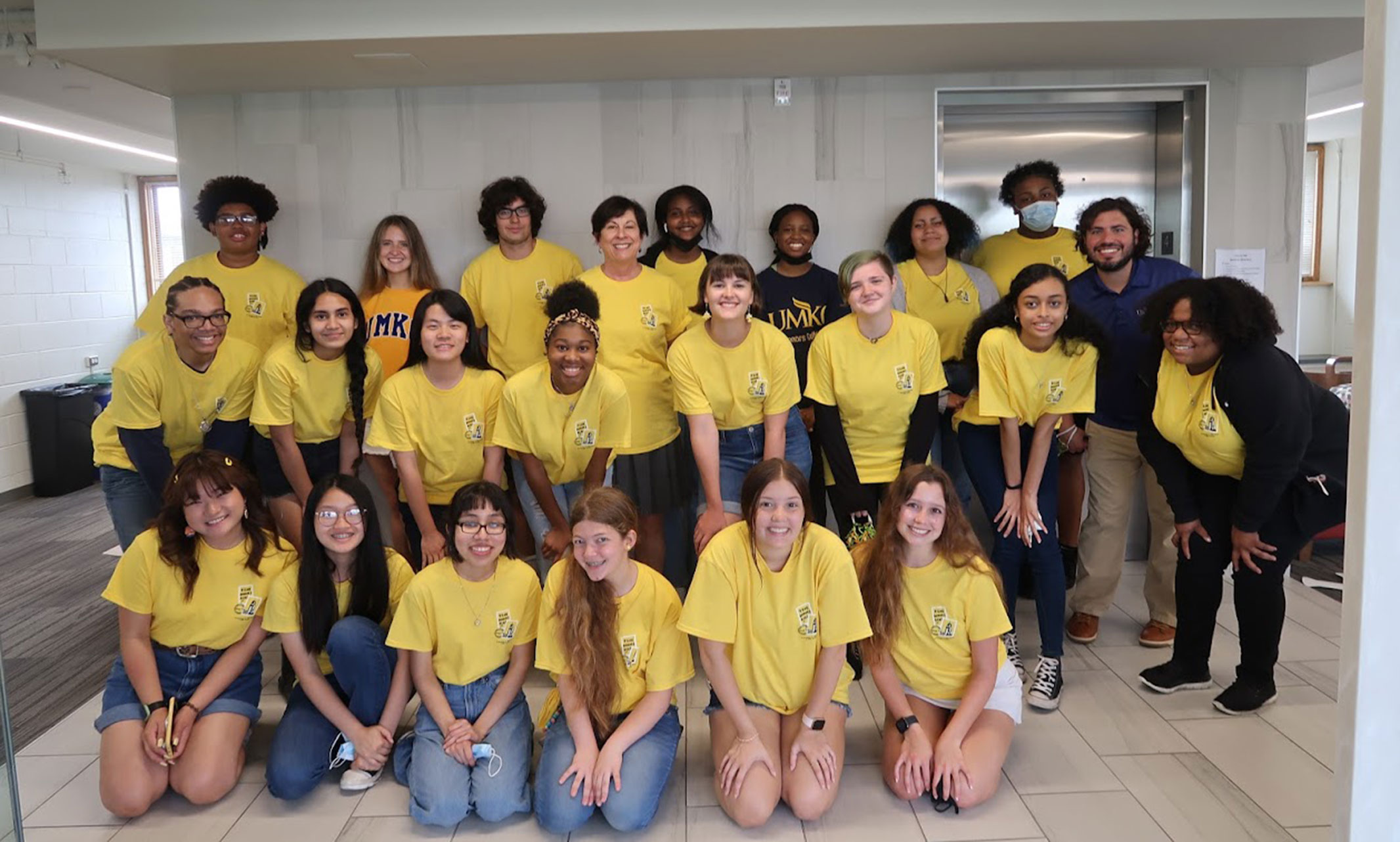
UMKC Honors Program hosts unique enrichment opportunity for high school students
The Roo Honors Academy invites high school students to participate in a fun and intellectually engaging one-week summer enrichment program, June 20-24, 2022, sponsored by the Honors Program of the University of Missouri-Kansas City.
This selective program will offer non-credit classes on criminal justice, urban health, effective personal communication and sports in society. Participants choose one morning course and one afternoon course taught by UMKC faculty members. On June 24, participants and their families are invited to a dinner and student exhibition.
“The Roo Honors Academy gives students the chance to dig into a subject they are interested in but haven’t been able to explore in high school yet,” said Margo Gamache, director of Student Services for the UMKC Honors Program. “It is about curiosity and expanding students’ minds.”
Students who successfully complete each course will receive a Recognition of Achievement certificate from the UMKC Honors Program and a Roo Honors Academy T-shirt. Tuition is $275; children of UMKC employees are eligible for a $20 discount. Need-based scholarships may be available. Participating students also have the option of staying in the UMKC dormitories for the week. The add-on cost for this option is $295.
“Other summer enrichment programs for high achieving high school students in the area focus on STEM, so this allows us to fill that need in the community,” Gamache said. “The Academy also helps students see UMKC in a new way. Students can experience innovative Honors Program classes and meet our passionate, engaged faculty. They will also get to know other bright and committed students from across the country—peers who could be future classmates at UMKC.”
Students can apply to attend the Roo Honors Academy online. The application deadline for Roos Honor Academy 2022 is June 1, 2022, and applications will be reviewed on a rolling basis.
Apr 29, 2022
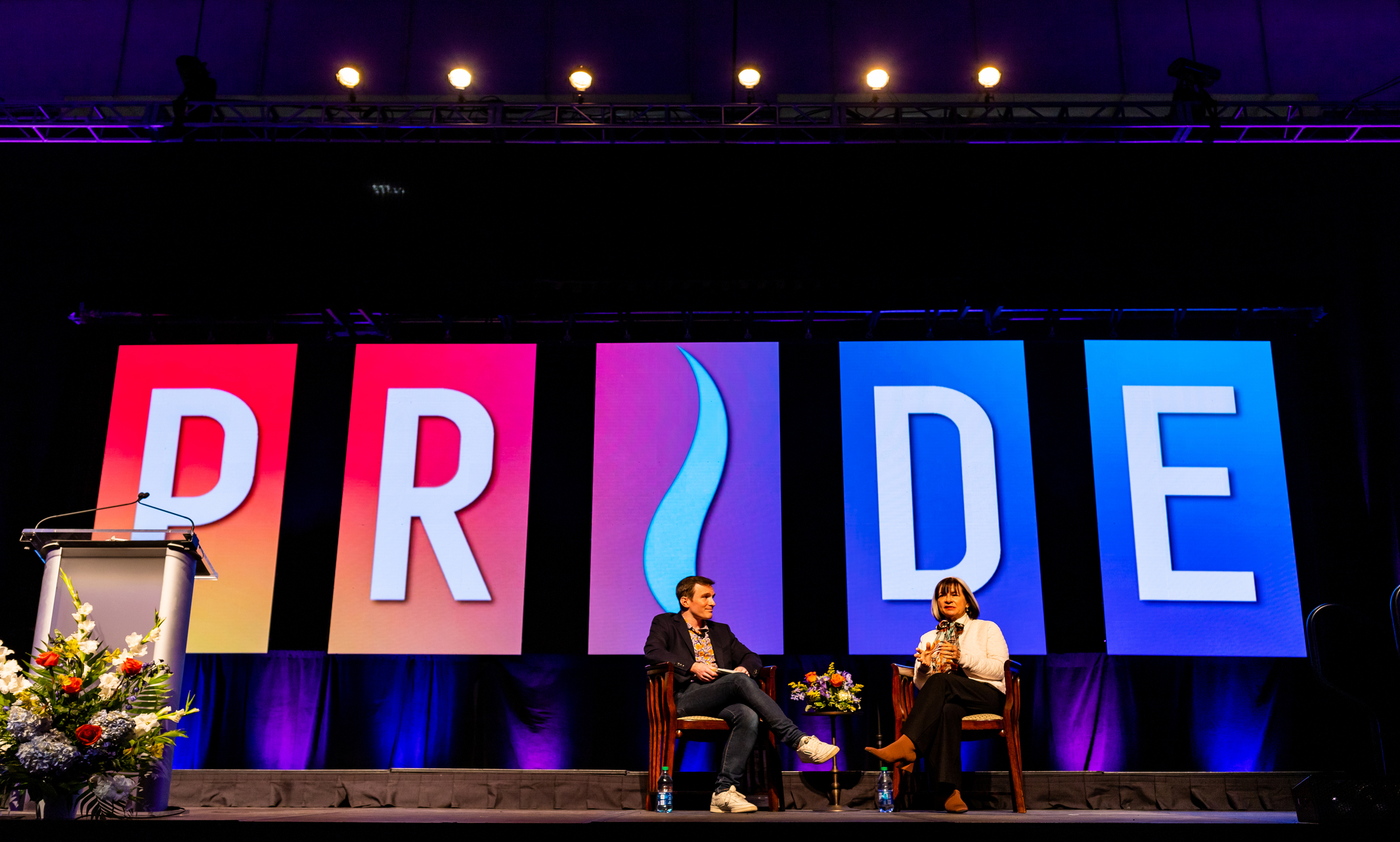
The event raises funds to support LGBTQ students at UMKC
Kindness can literally save lives. That was the vital message delivered to the audience at this year’s UMKC Pride Breakfast by Peggy Rajski, Academy Award-winning director and founder of the LGBTQ youth crisis-intervention organization The Trevor Project.
“Just to have one accepting adult in a queer-questioning child’s life, it can cut suicide risk in half,” Rajski said. “Anyone can be that one supporting adult; you just never know. I’m encouraging everyone to just be kind.”
Rajski won an Academy Award as director of the short film TREVOR, about a young teen whose world is turned upside down when word spreads at school that he might be gay.
“I am a white, straight, cisgender woman and people were surprised that I made this movie about this young gay boy and that it felt authentic. But what I would say is, I know the feeling just like everyone else does when people are shaming you for who you are,” Rajski said. “Imagine if you had everyone telling you that you are worthless, that they don’t want to be around you because you’re toxic, I just had hope that people would think about how those words would make someone feel.”
After the film’s release, she discovered there weren’t any nationwide suicide prevention crisis services available to support gay and questioning youth. In response, she founded The Trevor Project. The project, launched in 1998, receives roughly 200,000 calls annually.
Since 2008, the Pride Breakfast has raised funds to support LGBTQ students at UMKC and serves as a way for the university to show support for, and commitment to, LGBTQ students on campus. This year’s breakfast raised over $110,000, which will go directly to supporting LGTBQ students on campus.
“Over the years this breakfast has raised more than $500,000 in scholarships, emergency aid and support for students,” Chancellor Mauli Agrawal said at the event. “UMKC has a culture of care that we uphold. Faculty, staff and administration believe that each student has a unique value and is worthy of our time, attention and respect. I am honored to be a part of an institution that has that as its core value.”
UMKC partnered with local Kansas City nonprofit SAVE, Inc. to bring Rajski to Kansas City. SAVE, Inc. provides permanent, transitional, and emergency housing services to those with HIV/AIDS, substance abuse, mental health challenges and more.
Apr 27, 2022
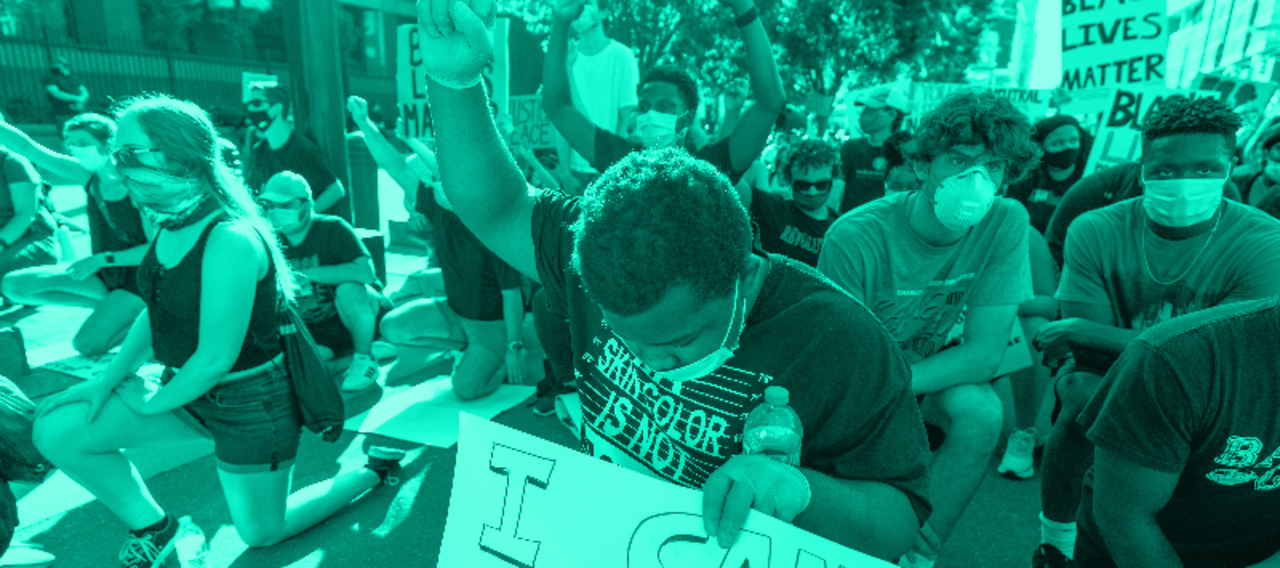
UMKC hosts discussion to explore new perspectives on higher education
The April 6 discussion in the Critical Conversations series of panel discussions addressing systemic racism sponsored by the UMKC Division of Diversity and Inclusion. It was the third of the 2021-22 school year and the eleventh in the series.
The Critical Conversations series is a part of Roos Advocate for Community Change, a campus-wide initiative launched in June 2020, which highlights thoughtful action on campus and in our community to ensure lasting and comprehensive changes. The goal of each Critical Conversation discussion is to enlighten, educate and explore the causes and potential cures for racism. Attendance to the discussions is free.
Panelists for this session included:
Gary O’Bannon, executive in residence, Henry W. Bloch School of Management, moderator
Jenny Aktar, UMKC student moderator
Kimberly Beatty, Ed.D., chancellor, Metropolitan Community College
Mark T. Bedell, Ed.D., superintendent, Kansas City Public School District
Laura Evans, business and education advisor-in-residence, Ewing Marion Kauffman Foundation
Amos Jaimes, UMKC Financial Wellness Center
Excerpts from the conversation are below. To view the complete recording of the conversation, click here.
Determining the value of college educations
Jaimes: I found great value in the learning communities with my peers, and talking deeply about theories and thoughts, and when there were other people and students of color in the room, we could really talk about our own backgrounds and connect. I found all of my best friends and fiancé within student organizations.
Evans: I came from a small, rural farming community and went to one of the largest colleges in the United States. It opened my perspective, and I developed a community where I learned to think and communicate more effectively. The academic challenge created a deeper work ethic in me for learning.
Beatty: I went to Morgan State University, a historically Black college. I wanted to know more about my culture and the sense of community.
Measuring the value and costs of a college education
O’Bannon: College costs continue to skyrocket, which impacts all races, ethnicities and genders. Loan interest rates have a greater impact on underserved students. But there's a report by the College Board that show that an average African American male with a college degree earns roughly twice that of someone who only holds a high school diploma.
Evans: What we know about how college translates to earnings is entirely a historical perspective, and the cost has gone up exponentially. We know that the world of work is changing rapidly. I would just caution us to not just look at data as we're making a decision about the value. I think the other thing I would point out, is what we perceived to be the value of our experience is not financially measurable.
Impact of major selection and experience
Bedell: College itself is a wonderful experience. Programs are developed to help you get ready and ultimately figure out what your passion is. I tell people that you should reflect on why you want to go to college and your desired outcome. It’s about what you decide to make out of it – and it’s not just about the money. It’s about passion. Everything else tends to work itself out down the line.
Evans: Some employers will be attuned to a particular major or set of skills. But most employers are looking for the most durable skills -- problem solving, the ability to communicate, the ability to collaborate. You may have acquired those skills in internships, but it could also be volunteer or extracurricular experiences. There are lots of ways to engage in the world and develop the kinds of durable skills that will help you to transition from what you studied to your initial job.
The value of community college
Beatty: Community college is not a replacement for four year colleges. It is a pathway and an affordable, local and convenient option. In Missouri, any courses that you take at Metropolitan Community College transfer directly to any of the four-year public universities, and often private ones. For people who need to work or have families and need flexibility they are an option.
Bedell: The A+ Scholarship Program (which provides scholarship funds to participating community colleges to eligible graduates) can really benefit students and allow them to knock out some of their core prerequisites.
Support for enrollment
Jaimes: Our office has conversations at events with students where we will sit down and help them fill out their FAFSA, because that is a barrier for a lot of students. This can prolong their ability to receive aid. We saw $3.7 billion in Pell Grants not being awarded to students, because they did not complete the FAFSA.
Impact of COVID-19
Bedell: We’ve been able to document that (COVID-19) has significantly impacted our kids. A lot of the work we did earlier around real-world learning was put on hold during the pandemic.
Jaimes: We saw a lot of our students working many hours to make up for the loss of income. Their households were severely changed; their ability to connect with peers in high school, but also the ability to engage in community college.
New Perspectives
Bedell: Traditionally, we have to be in school for the same hours. What if we created master schedules that allow for kids to operate on a much more flexible schedule that controls for the variables of poverty. What if we said it's going to go from 8 a.m. to 8 p.m.? Kids who need to do internships with a business could do that from 8 to 12 and maybe come into school for four hours and take classes online. These kids have to be trained for the workforce that they're going to go into, which offers a much more flexible working environment than what we currently have set up in pre-K through 12.
Apr 22, 2022
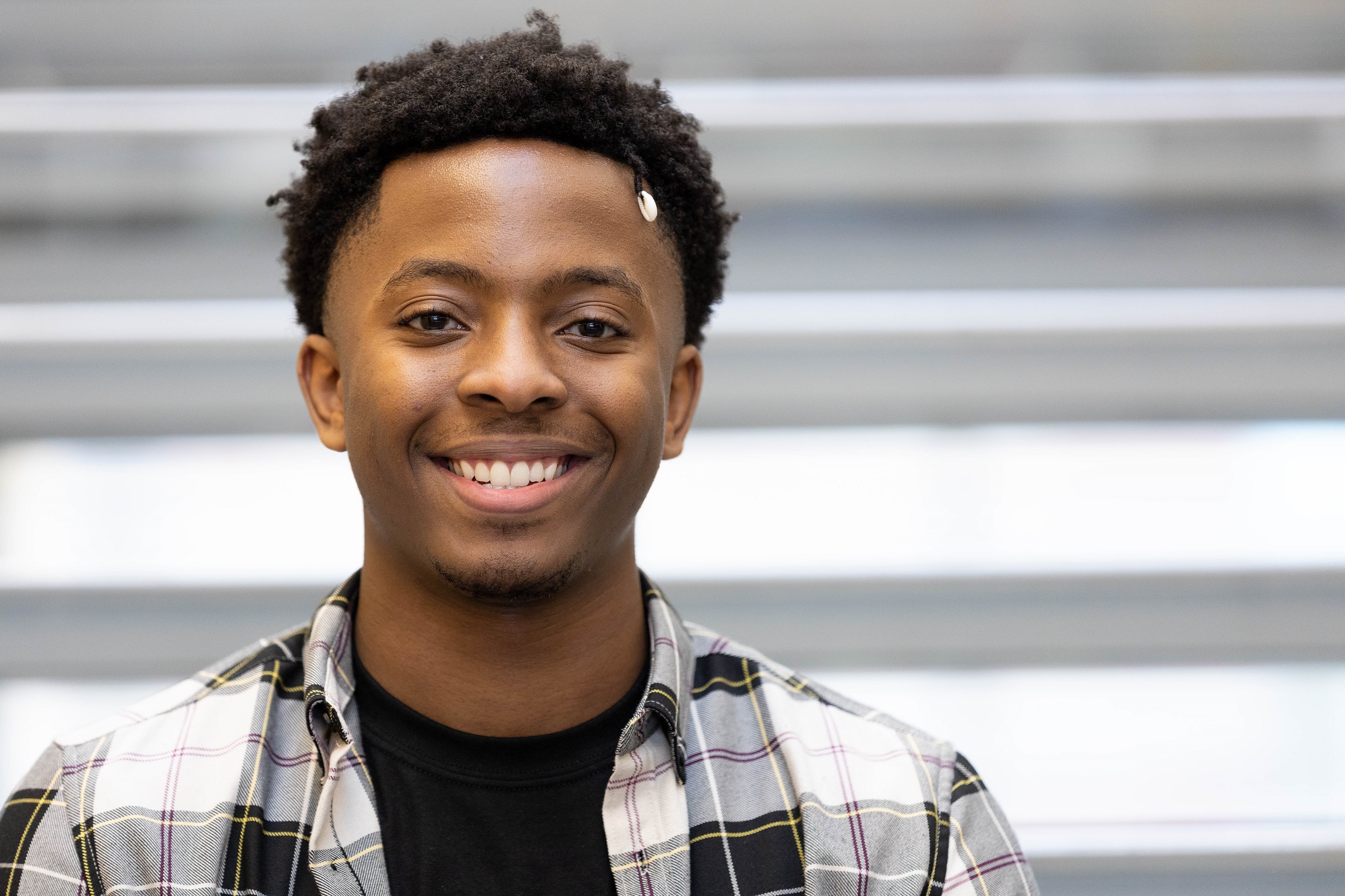
UMKC student leader works to create community change
Roos don’t just dream, they do. Our students turn ideas into action every day. Get to know our people and you’ll know what UMKC is all about.
Chiekezie AnikweAnticipated graduation year: Spring 2023UMKC degree program: B.S. biology, pre-medical emphasisPresident African Students’ Association, secretary Men of ColorHometown: Kansas City, Missouri
Chiekezie Anikwe chose UMKC because it is close to home, which is convenient and helped him keep expenses in check. He also likes taking advantage of being in the heart of Kansas City. His pre-med program is challenging, but he finds time to connect with friends through his involvement - and leadership - in extracurricular activities.
Why did you choose your field of study?
I have been surrounded by family members who were in the healthcare field all my life, so I grew to appreciate and love the different types of service that they provided for the community. I was always interested in the different stories and experiences they shared with me. With this field of study, I hope to be able to help people who are disadvantaged and play my part to make change in my community.
Since entering college, what have you learned about yourself?
One of the main things I learned in college was how to push myself harder. Transitioning from high school to college, I learned that I had to put in more work to be successful. Also, I learned that it is okay to ask for help. That wasn’t always easy for me. I always thought I could do things on my own or figure it out myself. We all need help sometimes.
How has your college program inspired you?
The program is full of a lot of hard-working people from professors to students, who in turn push you to do the best that you can.
What are the benefits of the program?
A main benefit of the program are the resources that they provide to help us do well. The professors are really helpful in making sure we understand what we are being taught. And my Supplemental Instruction (SI) study group helps me look at the content in a different way. Sometimes in class something may not make sense, but when I can talk to a fellow student about it at SI, I understand it.
What are the challenges of the program?
The classes are really tough, but they are interesting. With proper study habits, hard work and time management skills it is definitely possible to do well.
Another challenge with the program is not seeing more people who look like me. There is a huge need for more African American people in healthcare.
Is this why you became involved in the African Students’ Association and the Men of Color?
I love the African Students' Association and Men of Color because of how we are able to create a space where Africans and men of color can be comfortable to be their true selves. The African Student Association is my home. I became a member my freshman year and everyone was so friendly and inclusive. There were a lot of seniors on the board, and I thought, “Maybe I could help.” I became vice president my sophomore year in the midst of Covid-19. I’m president this year and I’ve had so much help from my team in boosting membership.
Who/What do you admire most at UMKC and why?
The thing I admire about UMKC is that it is full of inspirational people who are very determined to be successful in their own respective fields. There are many people at UMKC who are making change, and these are the people I admire the most. Roland Hemmings (assistant director, Multicultural Student Affairs and Men of Color staff advisor) has been a great mentor.
Do you have any scholarships? What do they mean to you?
I received the Chancellor’s Award. It means a lot to me just because it helps take a bit of the burden of tuition off.
What do you hope to take from your experiences at UMKC into your professional career?
I plan to take the work ethic and time management skills that I developed during my time at UMKC to further my professional career.
Apr 22, 2022
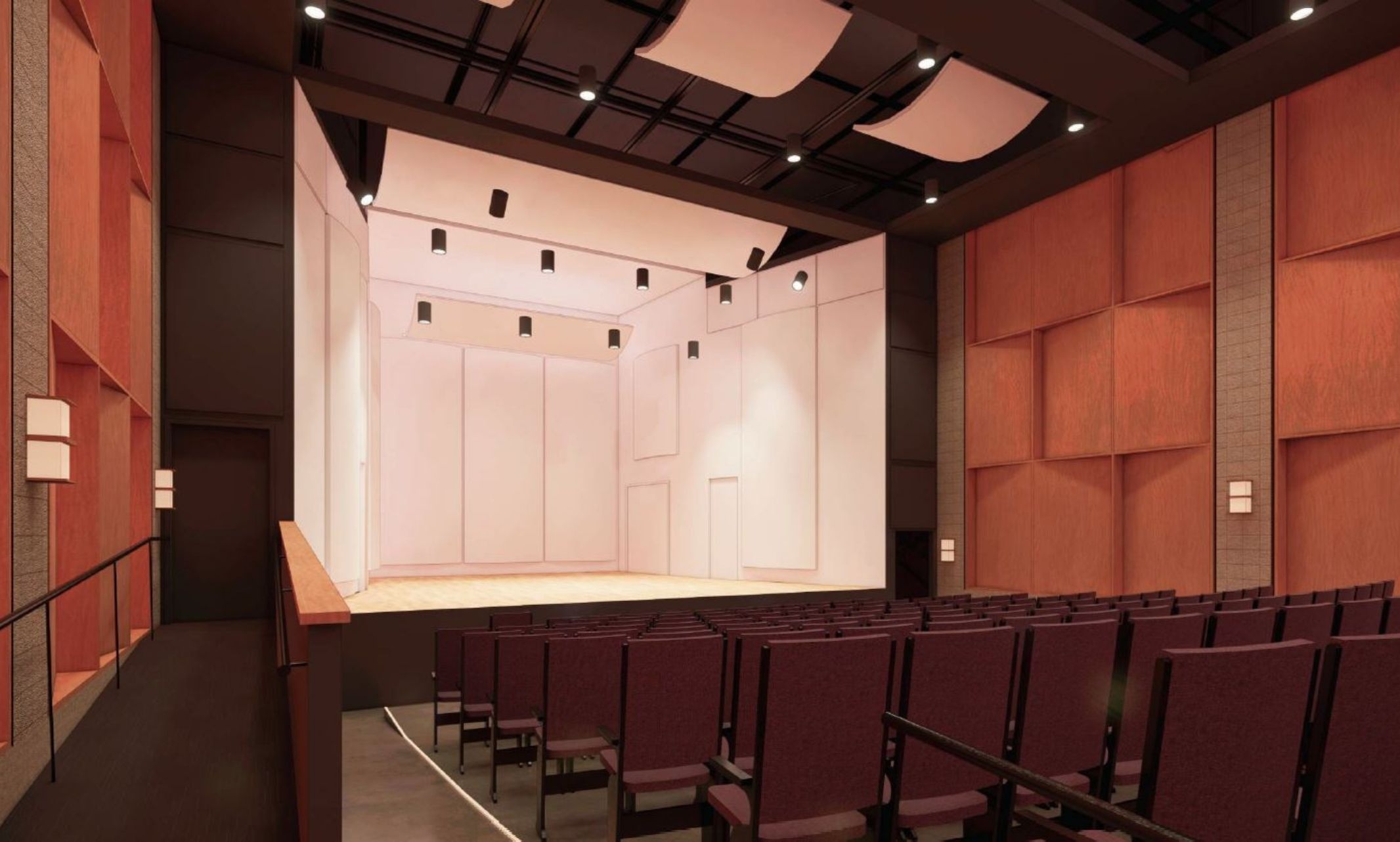
Recital and rehearsal spaces will get improved soundproofing and technology
Renovations on Conservatory facilities will begin next month, the first of a series of renovations and expansions.
Beginning the Monday after commencement, the $4 million renovation project will focus on hearing safety, updated technology, increased usable space and ADA compliance. The construction is expected to be complete before fall semester classes begin in August.
Rendering of Grant Hall recital hall by Helix Architecture + Design
“Sound is an important part of the student and visitor experience here at the Conservatory,” said Andrew Granade, interim dean of the Conservatory. “These renovations will allow our students to better hear and finetune their musicianship, and our visitors will enjoy performances that are equal to the talents of our musicians.”
Rendering of teaching room in James C. Olson Performing Arts Center by Helix Architecture + Design
Visitors will see changes in the Grant Hall recital hall, including new acoustic treatments, new sound equipment and updates to improve ADA compliance.
Rendering of hallway to individual practice rooms in James C. Olson Performing Arts Center by Helix Architecture + Design
Student practice rooms and rehearsal spaces in the James C. Olson Performing Arts Center will be updated with new technology and acoustic treatments, in addition to soundproofing, new flooring and an increase in usable space. Practice and rehearsal space renovations will improve hearing health and accessibility.
Rendering of individual practice rooms in James C. Olson Performing Arts Center by Helix Architecture + Design
Renovations and expansions in the Conservatory will take place over the next several years in both Grant Hall and Olson Performing Arts Center. Funding for this first stage of renovations includes $3.5 million in state funding and $500,000 in gifts.
Apr 21, 2022
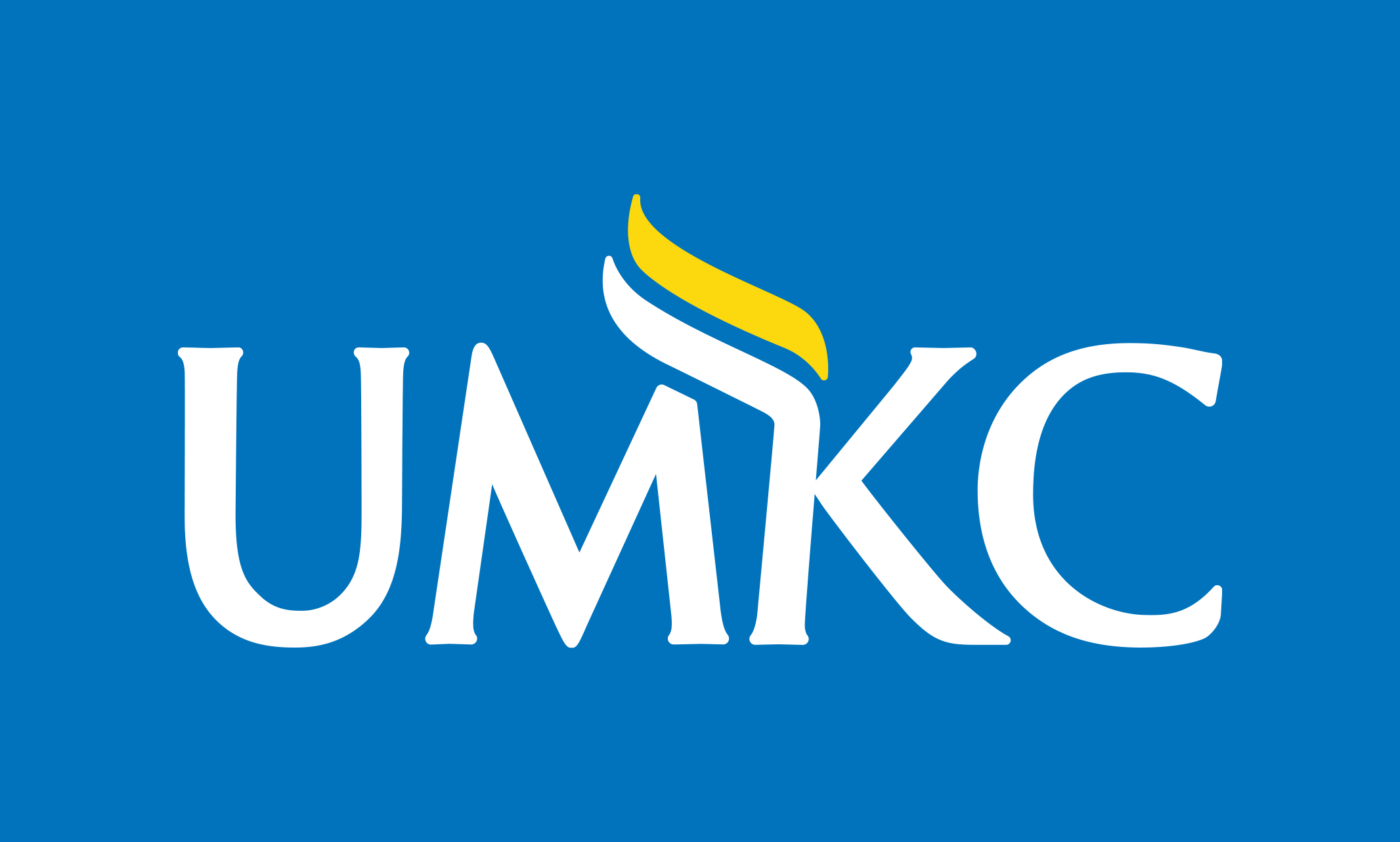
The logo update maintains its visual roots while strengthening its visual presence for current needs
The University of Missouri-Kansas City has unveiled an evolution of its logo, which will soon be seen rolling out across campus. This refresh will strengthen the university’s visual presence for today’s needs while retaining legacy elements of its signature brand.What’s new is that UMKC condensed and strengthened the typeface for better readability on digital devices and on social media. In addition, the UMKC logo will now carry more visual weight when partnered with other logos.And yet, this brand stays true to its visual roots. The symbolic “flame” in the flourish of the letter K draws your eye to the torch image that symbolizes both the lamp of knowledge and the ceremonial mace carried by faculty into commencement ceremonies. To create this refreshed logo, designers in Strategic Marketing and Communications worked in consultation with Bernstein-Rein, the creative agency that developed the current UMKC logo.
Anatomy of a refresh
The evolved logo was created by solving for a list of design challenges independently and then combining the best solutions into a final design. The goal was to give the logo a modern update while maintaining the integrity of the mark and ensuring continuity in brand recognition. The adjustments improve readability at smaller sizes, allow for better alignment and increase visual weight so that it pairs better with other logos.
Updates coming soon
The project that spurred the logo refresh will soon be visible all across the UMKC campuses in the form of repainted wayfinding signs. Many of the campus signs have faded over the years and reflect several generations of color and brand style, some of which are nearly forty years old. In addition to the signage refresh rolling out in May, updates are also coming to the university websites and social media icons very soon.
The new logo will be phased in over time and will be automatically incorporated into new projects. Digital updates will made as soon as possible. Updated guidelines and logo files are available on the Strategic Marketing and Communications website. Faculty and staff can update their email signature to include the updated logo.
Apr 20, 2022
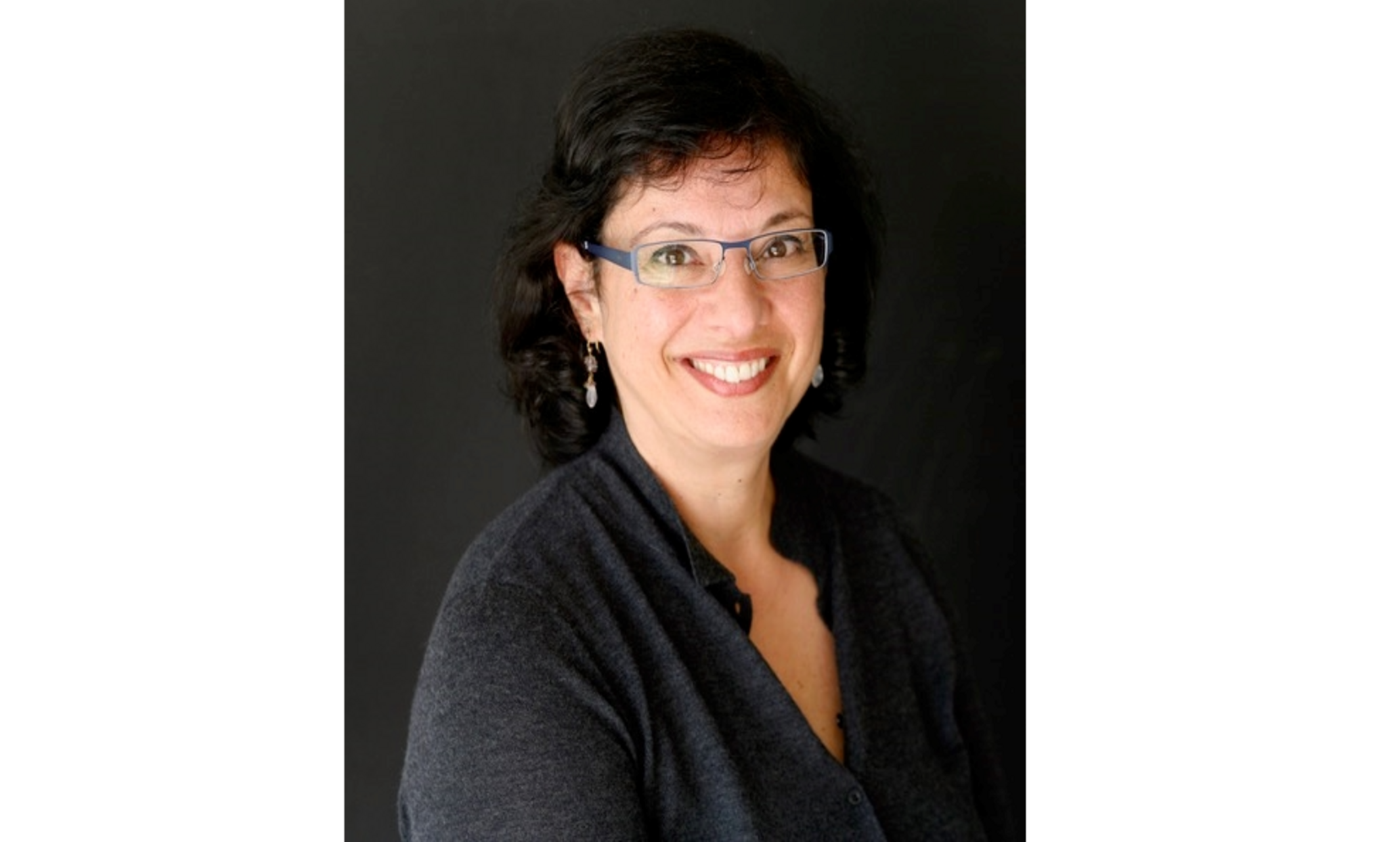
The annual lecture honors the legacy of civil rights leader
Sonia Nazario headlined the UMKC Division of Diversity and Inclusion’s 14th annual César Chávez lecture this week.
The lecture honors César Chávez, organizer of the Chicano Movement in the United States and founder of the United Farm Workers. It is meant to raise awareness of the continual struggle for civil rights, including humane working conditions, dignity, equality and access to opportunity for all.
Nazario is a two-time Pulitzer Prize-winning journalist whose stories have tackled difficult issues such as hunger, drug addiction and immigration. She spent decades reporting and writing about social issues for newspapers, including the New York Times, Los Angeles Times and Wall Street Journal.
Below are some highlights from the lecture, which was held virtually this year.
On winning her first Pulitzer:
I wrote about this army of children migrating north alone through the true story of one boy, Enrique, whose mother left him in Honduras at just 5 years old. Then, 11 years later he decides to set off to go and find her. I met Enrique in northern Mexico when he was mid-journey. He was on his eighth attempt to enter the United States. He had been deported seven times.
I then made the same journey he had made. I traveled for three months, 700 miles, half of that time on top of seven freight trains. What I witnessed changed me. Children who had lost arms or legs from trying to jump on trains were trying to reach the United States to find opportunities that I honestly took for granted.
On advocacy:
In 2008, I left daily journalism to write books. At that time, I decided to wade into advocacy gingerly. More and more, non-engagement to me felt wrong. Keeping silent about some of these issues felt amoral. But my readers pushed me to do more.
When I talked about immigration, they didn’t understand me saying, “Here is the problem, you should get involved to fix it.” Their issue was, why did a journalist like me, who knew an issue so well after decades of covering it, feel entitled to put the issue to their readers and expect them to figure out a solution.
I joined the board of a nonprofit started by Microsoft and Angelina Jolie called Kids in Need of Defense. I fought alongside my colleagues there to help recruit wonderful pro-bono lawyers to represent immigrant children in court for free.
I’ve had dozens of students hear me speak over the years and decide in that moment, I am going to become a lawyer and then return to another talk years later, “I am now representing those immigrant children you told me about.”
Apr 20, 2022
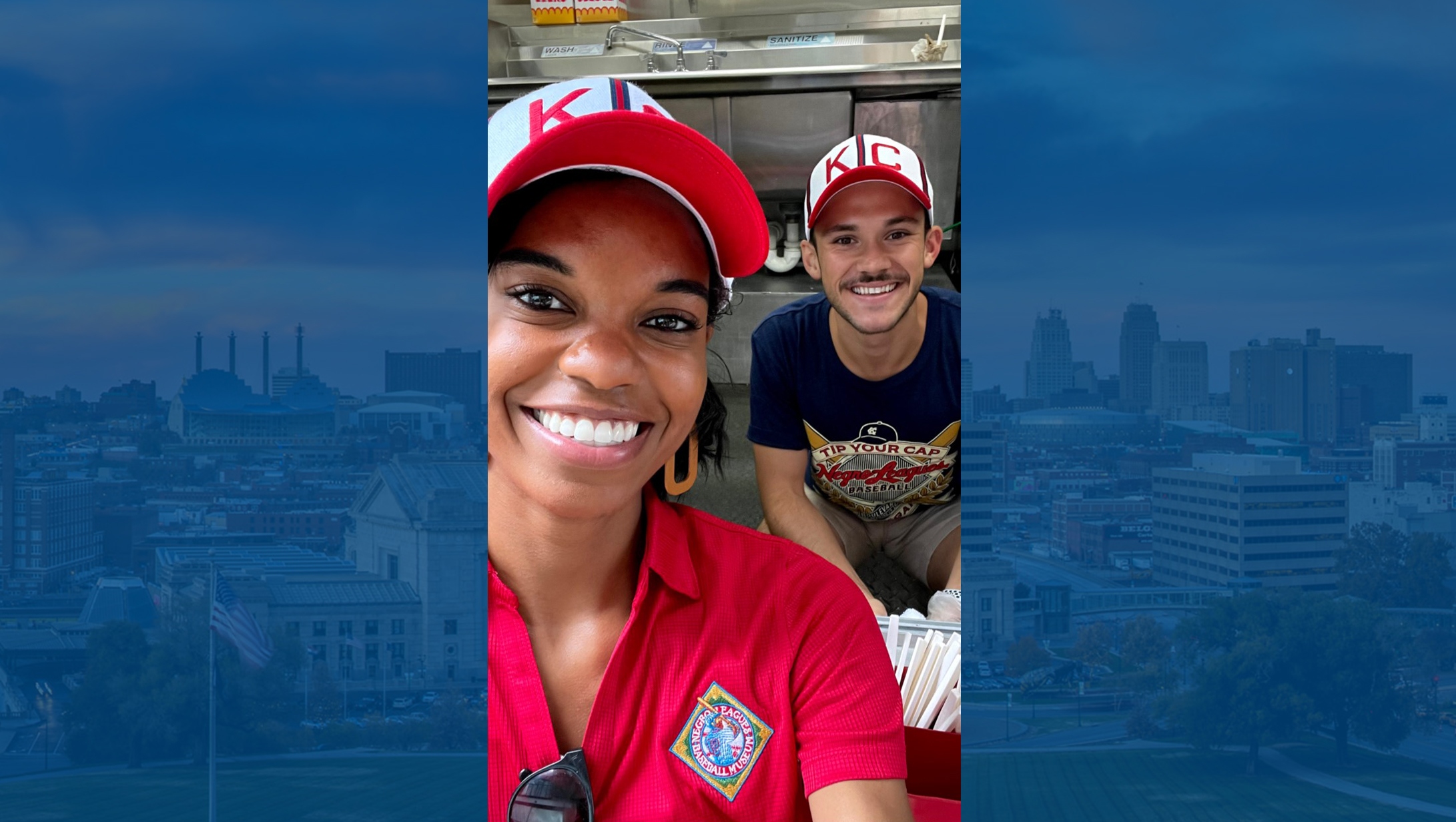
Two Bloch alumni are making their mark in KC
When people go to school to earn their degree, they go for more than the reading, writing and arithmetic. They go to hone skills and form connections that will propel them into fruitful careers.
Two UMKC Henry W. Bloch School of Management alumni are still building those connections — and building up Kansas City along with them.
The partnership between the two began when Kiona Sinks (MBA, ’21), the digital strategy manager for the Negro Leagues Baseball Museum, noticed a local hinderance and decided to turn it into an opportunity. Sinks was aware that Alec Rodgers (B.B.A. ’20), a fellow Bloch School graduate, had purchased the local ice cream staple Betty Rae’s, and she wanted to show her support.
“I think one thing that I've learned in Kansas City — we have all the right people, all the right tools, all the right resources, but sometimes we're not great at aligning things strategically,” Sinks says. “Ice cream and baseball historically go hand in hand. When you go to the ballpark, you get a hotdog and a cone. That’s when I thought it’d be really cool to reach out.”
A sweet new collaboration was born.
“Kiona reached out asking if we wanted to partner with the Negro Leagues Baseball Museum, and of course it was a yes from the start,” Rodgers says. “I thought it would be fun to raise funds and awareness for the museum — even just for the collaboration with ice cream and the museum itself. It's like a match made in heaven. Baseball and ice cream go so well together anyway.”
The plan went into motion with the Betty Rae’s truck outside of the museum. Passersby were eager to investigate the bright blue truck, and the warm day called for something cold. Everyone who bought a scoop got a $2 discount off museum admission. The partnership also resulted in a signature flavor: Cake, Batter Batter — a spin on the classic flavor with the colors of the museum swirled in. The treat was a home run, as is the new partnership between two successful Roos.
“I think working with UMKC alumni has been a testament to the culture at UMKC,” Rodgers says. “It’s great. When you’re on campus and involved, you start to feel like it’s home. It’s been neat to make the city an extended home of UMKC. It feels like you’re seeing people you know everywhere, which is so comforting.”
Sinks shares the same feelings about her graduate school experience at UMKC. That’s part of the reason she reached out to Rodgers in the first place.
“I've watched his story progress in the community, in his 20s, thrust into this new role,” Sinks says. “When he took over ownership, I really wanted to be a support to him. And obviously, I literally love ice cream.”
Alec Rodgers
Rodgers took over Betty Rae's ice cream in 2021. Photo by Brandon Parigo
Sinks is far from alone when it comes to her feelings about ice cream. Rodgers just so happens to have a special connection to Betty Rae’s that extends beyond the scoops.
Rodgers made headlines in 2021 when he took over Betty Rae’s fresh out of the Bloch School. It helped that he scooped ice cream there when he was a student at UMKC, but it was more than a part-time job. He often spent time in the stores — even when he wasn’t scheduled to work — catching up with work friends while making a fresh batch of waffle cones. The stores also provided a change of scenery for studying.
Because of his passion for Betty Rae’s, Rodgers did not hesitate for a moment when the previous owner came to him about purchasing the business, even during a pandemic. He has experienced plenty of success since, though he still faces challenges as a young business owner.
“It's definitely a little intimidating most days,” Rodgers says. “In other ways it's been really good because it gives me a different perspective (having) a lot of employees under a young owner. I find it’s easy to relate to them and where they are in life.”
Under Rodgers’ leadership, Betty Rae’s took the slower winter season to develop new offerings, like cakes and ice cream flights — which will have vegan and non-dairy options — in addition to seasonal rotators and fan favorites.
Betty Rae’s has also added some new creations. Their rotating stock has featured flavors inspired by McLain’s Bakery, Andre’s Chocolates and the Negro Leagues Baseball Museum, as well as UMKC, of course. The Roo Blue Swirl flavor was added to the store last August, with the ceremonial first scoop going to Chancellor C. Mauli Agrawal.
That UMKC connection is apparent with both Bloch School alumni.
Kiona Sinks
Sinks works as the digital strategy manager at the Negro Leagues Baseball Museum. Photo by Brandon Parigo
Rodgers’ time with Betty Rae’s goes back to his college experience, and Sinks’ time at the Negro Leagues Baseball Museum follows a similar path. Having been with the museum for more than a year and a half, Sinks started her work as digital strategy manager while earning her master’s degree at UMKC.
“Students in the MBA program are working professionals, first and foremost, and then you slap trying to get a formal education on top of that,” Sinks says. “It can be difficult. Things are not promised. I didn't have this job when I started my degree. I did my own consulting, and I was not waiting for something to come to me. Looking back, it was a great self-investment for me.”
Sinks also knew the Bloch MBA program had benefits when it came to networking opportunities.
“With the Bloch school, I can't tell you how many people are in the local business community,” Sinks says. “They're CEOs, they're executives, and I’m regularly able to interact with and get to know them. You just see the outpouring of love that people have for this institution. It makes you proud. That's what you want. You want to be proud of where you've invested your time.”
In the meantime, the Negro Leagues Baseball Museum is preparing to celebrate the 75th anniversary of Jackie Robinson breaking the color barrier. Sinks is eager to get the word out and grow the museum.
“These life lessons that stemmed from the story of the Negro Leagues continue to be an inspiration to me every day, and I think that was the motivation to reach out to Alec,” Sinks says. “Obviously, it doesn't hurt that he’s also a UMKC alum. It puts two and two together. He's a great person, and I’m wishing him all the success for all he's going to do in Kansas City.” The community has likely not seen the end of their friendly partnership, either.
“We both quickly realized that we share a love for Kansas City, a love for the communities that we’re involved in,” Rodgers said. “Kiona has a servant-leader heart, and it was quickly recognizable in her. We both realized that we had a lot in common in that area as well. We just pitch to each other our long-term goals and long-term ideas in the city, and they align really well.”
Apr 18, 2022
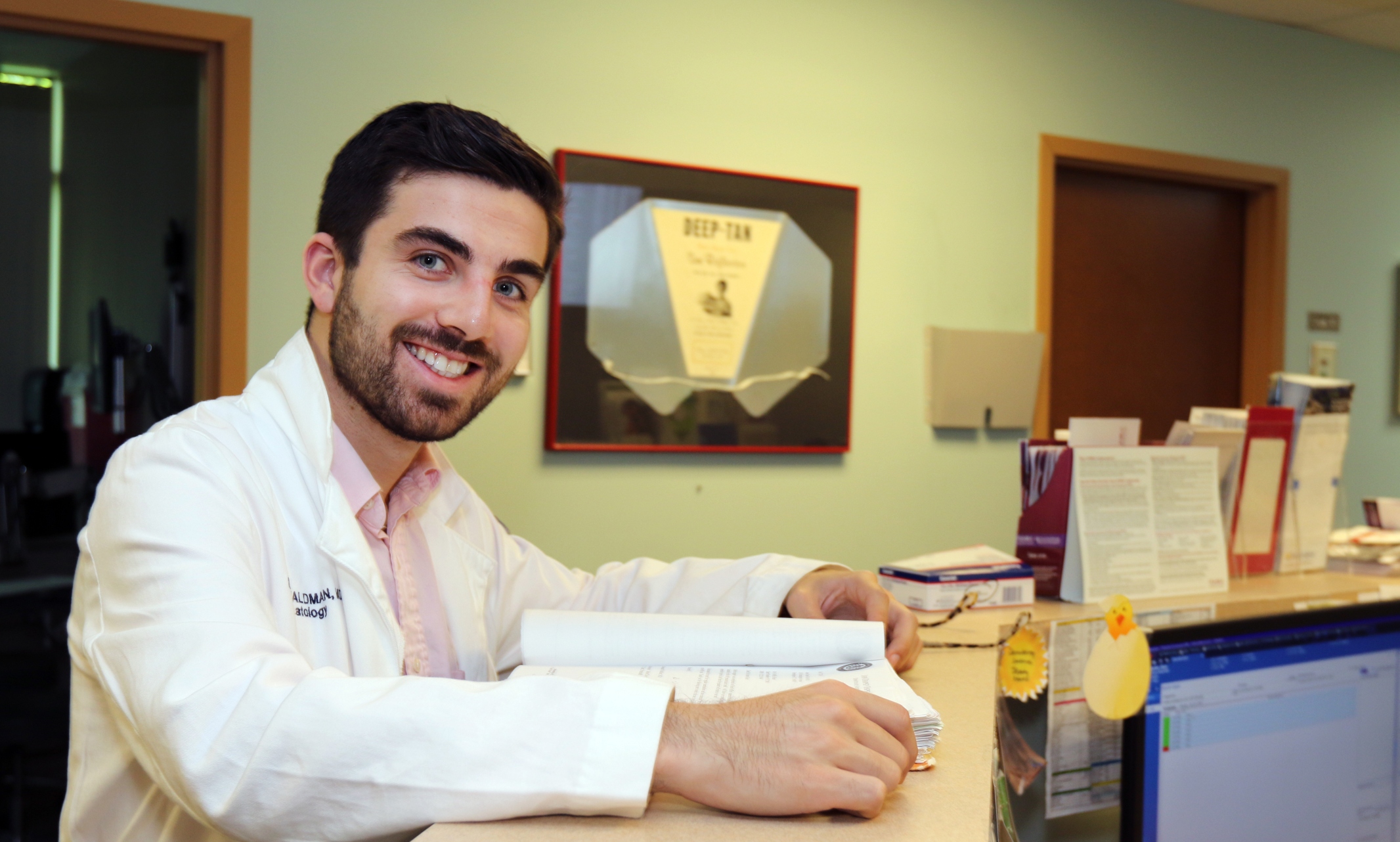
How a UMKC graduate turned an idea for a wart treatment into a multi-million-dollar startup
After graduating from UMKC’s six-year B.A./M.D. program and becoming a dermatologist, Reid Waldman (B.L.A. ’16, M.D. ’17) noticed a lack of kid-friendly wart-treatment options. So he worked to turn that gap in the market into a new business venture that has rapidly taken off.
Shortly after graduating from the UMKC School of Medicine, Waldman competed in a Dermatology Hackathon — a competition designed to spark new ideas and industry collaborations to improve standards of care and treatment for skin conditions.
“The team came together during the competition looking to research the problem of childhood wart treatments being painful, scary and ineffective,” Waldman says.
During that competition, the idea for VeraDermics was born. The company makes kid-friendly patches to treat warts in children.
An estimated 10-to-20% of children develop common skin warts, but existing treatment options were not “kid-friendly,” as they were largely time-consuming and expensive, Waldman explained.
“We’re dermatologists developing drugs for dermatology,” Waldman says. “Everyone on our core management team is a dermatologist. We use our end-user knowledge as physicians who actually use the products that we develop to better understand what doctors and patients want out of new therapeutics. It's a very novel approach to drug development, which is otherwise often done by people who haven’t spent appreciable time in the clinical arena.”
To date, Waldman and the VeraDermics team have raised more than $22 million to launch the company and bring the product to market. Currently all of the company’s products are still in the pre-clinical phase, either undergoing formulation work, validation in the lab or ongoing process development. Waldman says in drug development it’s important to ensure every batch of a medication is identical, so his teams are investing heavily to ensure they get it right.
“It's amazing to be at the stage we’re at now, because all of the corporate planning takes years, and we've been working on this for so long,” says Waldman. “There are many milestones that at one point seemed so far away. It’s really mind blowing the closer we get. And I think this is going to be an especially exciting year for us."
Waldman says through building his company from the ground up, he realized the strength and reach of his UMKC alumni network. From donations to well-wishes and even business advice, he’s benefitted from the connections he built while enrolled at UMKC.
“The six-year B.A./M.D. program at UMKC is the cornerstone of why I'm interested in drug development,” Waldman says. “My UMKC medical training and then the medical training I had postgraduation have really helped me recognize certain areas of unmet need within medicine and specifically within my field of dermatology. Through my medical training I can appreciate some of these more niche areas of unmet need that are otherwise not necessarily a focus of larger pharmaceutical companies.”
“It's amazing to be at the stage we’re at now, because all of the corporate planning takes years, and we've been working on this for so long.” — Reid Waldman (B.L.A. '16, M.D. '17)
He didn’t have to look far to start building connections with other UMKC alumni.
Waldman comes from a UMKC legacy family. In fact, the family’s Roo tradition began in 1929, when Reid’s grandfather, David Waldman (J.D. ’32), became the first graduate of three generations of Waldmans to be admitted to the Kansas City School of Law (now the UMKC School of Law).
Reid’s father, uncle and three siblings are all UMKC graduates. Waldman’s family received the UMKC Legacy Award at the 2014 UMKC Alumni Awards.
The UMKC School of Medicine is currently celebrating its 50th anniversary. Waldman says he’s proud to be a product of such an incredible and unique institution.
“I think it's amazing,” Waldman says. “My dad was in one of the early classes at the School of Medicine and then I was a graduate in 2017. In many ways, I think the medical school has changed quite a bit between the time my dad attended and when I graduated, and I know it has probably changed since I left. But in many ways the great education and uniqueness of the program remain.”
Apr 18, 2022
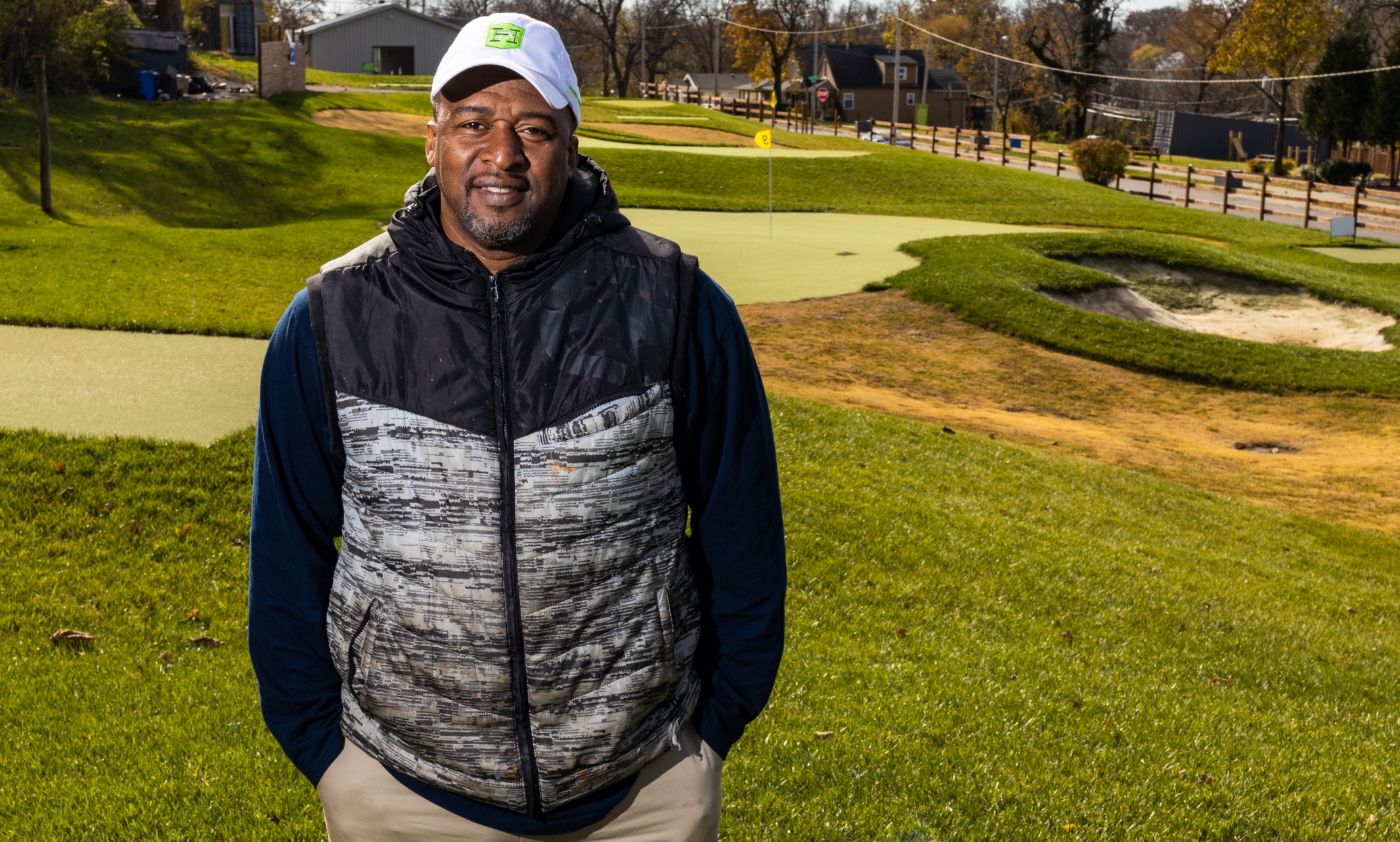
Chris Harris (B.L.A. '14), 2018 UMKC Alumni Award winner and founder of Harris Park, shares insights on transforming his community while helping KC...
Chris Harris’ (B.L.A. ’14) lifelong dream was to build a park where he could teach people self-esteem and basic life skills through sports and community. Today, that dream is a reality.
Where it began
Having grown up in the Ivanhoe neighborhood, Harris knew that people looked down on the area. The Ivanhoe of the 1980s and 90s was dotted with blighted houses, unkempt lawns and ragged, struggling plant life. The neighborhood had drawn associations with a history of crime and drug violence.
Harris was determined to change the mindset of outsiders — and the mindset of the people who lived there. No one was working for change, so he realized it would have to start from within.
In 1994, Harris enrolled at Penn Valley Community College. For a writing assignment, he focused on his dream: to clean up his community and teach the basics of life through sports. Putting the dream on paper made it seem real. Another event during his two years at Penn Valley convinced him it was possible.
In 1996, Harris led the unheralded Penn Valley basketball team to the NJCAA Division II National Championship. That gave him the confidence to believe he could achieve his dream. And he’s certainly come a long way since, receiving the College of Arts and Sciences Alumni Achievement Award at the 2018 UMKC Alumni Awards.
Making the dream real
For Harris, the hard work quite literally began at home. He started by tearing down his childhood home on Wayne Avenue and began the process of transforming the property into a community park and events center. He wanted to have an accessible park that made resources available to urban youth who lacked access to certain sports like golf, because they couldn’t afford a membership or lessons to learn.
Next, Harris bought the plots of land that covered both sides of Wayne Avenue between East 40th and East 41st Street. In the beginning, he was out there alone, doing the hard labor and getting his hands dirty on the grounds. Slowly, through networking, fundraising and building relationships and partnerships, he was able to raise $2.5 million to develop the park.
“All of it just fell right into place like a book,” Harris says. “That’s just how it happened, and it just kept growing.”
Family, friends and community volunteers helped along the way, but much of what is now Harris Park has been a one-man venture.
Today, Harris Park includes a compact 12-hole pitch-and-putt golf course and basketball court — all free for anyone to use. Harris Park has taken years to develop, with more changes still to come. Some plans have been put on hold since the pandemic hit, as the park has remained in the construction zone. But the plan is to open and operate fully in the spring.
In the meantime, Harris is constructing a stage in one of the buildings to offer a space for people to rent and hold events. There are also plans for a clubhouse with restrooms and a golf pro shop with merchandise, gear and snacks available.
“My heart and soul is in the beautification,” Harris says. “When I first started this, saying I was going to use sports as a catalyst to clean up our neighborhood and educate our neighborhood, I didn’t know that the place itself was going to be educational.”
The motivation behind it all
Sports have taught Harris how to navigate life’s challenges. He learned the most from the game of basketball. Harris knew if he did the little things to put teammates in their comfort zone, they were all going to play better. Once he realized this formula and applied it to his life, winning games led to winning championships — and doors began to open.
For Harris, it’s still all about putting people in their comfort zone so they can be the best version of themselves. He notes when people feel comfortable, they perform better and more effectively. Likewise, by creating opportunities and resources for people to come play a round of golf, shoot some hoops or simply hang out at the park, it creates a space to put people at ease and find refuge in a place that once offered very little.
“Can you imagine how many people have that ability, to do something, but don’t have the inspiration and desire to do it?” Harris says. “I’m trying to put them in that comfort zone, so they can do those things that they already have the power, strength and knowledge to do.”
Apr 18, 2022
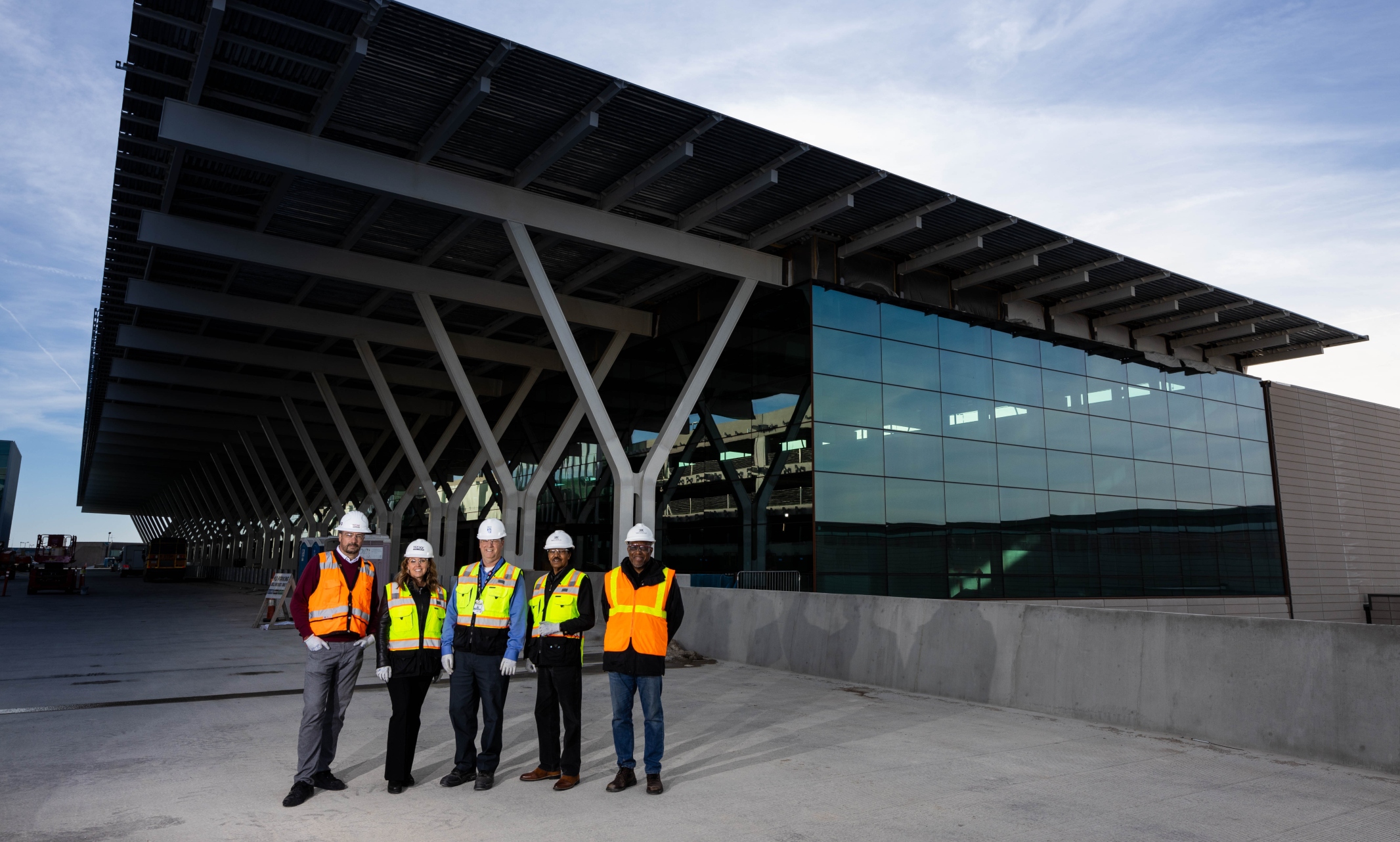
Meet several of the Roos making Kansas City’s new airport a reality
Since UMKC opened its doors in 1933, Roos have been integral players in many of Kansas City’s most significant projects. So, it’s no surprise that UMKC alumni have played major roles in the design and construction of the new single terminal for Kansas City International Airport.
The $1.5 billion, one-million-square-foot structure will have 39 gates spread across two concourses. A grand opening is scheduled for March 2023.Here’s a look at some of the Roos who are playing prominent roles in the project.
Hagos Andebrhan and Leonard Graham
Taliaferro & Browne engineering and architecture firm
Taliaferro & Browne Inc. is the lead landside civil engineer for the new single terminal project, with a team of eight subconsultant companies that work under their direction and management. The engineering firm has been integral to Kansas City’s growth for more than 60 years.
Hagos Andebrhan (B.S.C.E. ’78), CEO, and his partner Leonard Graham (B.A. ’74), president, have led the company as the civil engineer of record on projects including the redevelopment of Union Station and the IRS Regional Service Center, as well as renovations of Arrowhead and Kauffman stadiums, the KauffmanPerforming Arts Center and Berkley Riverfront Park. Despite the significance of these past projects, the alumni view their role in the single terminal airport as one of their most significant.
“The new $1.5 billion KCI single terminal is a project like no other,” says Andebrhan, who received the Defying the Odds Award at the 2020 UMKC Alumni Awards, as well as the School of Computing and Engineering Alumni Achievement Award in 2012. “It is a once in a lifetime project for the city and everyone involved in its construction.”
Taliaferro & Browne Inc. was in competition with national and international firms for their role in the project.
“When Clark Weitz Clarkson, the design builder, assembled its team, they wanted a landside design team that could deliver this highly visible project on time and on budget,” Andebrhan says. “We have been part of the airport’s growth for years and were proud to be selected based on our experience.”
The firm’s specific responsibilities include project management and coordination, design of permanent roadways, including roundabouts and bridges, street and parking lot lighting, surface parking lots, utility relocation, storm and sanitary sewers, mass grading and associated project phasing. In addition, they are responsible for the design of temporary roadway connections and temporary traffic modifications required to construct the new terminal while keeping terminals B and C open and in operation — with more than 20,000 vehicles arriving and departing daily.
“It is the largest single infrastructure project in the city’s history, and the largest construction project in which our firm has lead-design responsibility,” says Graham, who received the SCE Alumni Achievement Award at the 1993 UMKC Alumni Awards. “We understood the complexities and challenges of the project, but we were excited to roll up our sleeves and get to work. The KCI new single terminal project is probably one our proudest efforts yet. We were honored to be a contributor to this significant effort."
Kimberly and Trent Robinett
TREKK Design Group
Kimberly Robinett (B.S.E.E. ‘95), CEO and managing partner of TREKK, has led the organization with an entrepreneurial spirit since she founded it with her husband and TREKK partner Trent (B.S.C.E. ’95) in 2002. Her ability to focus on delivering quality work on schedule has led to TREKK’s participation in developing the infrastructure for the new Kansas City International Airport. Kimberly is committed to the success of the project as a Kansas Citian as much as a businesswoman.
Kimberly and Trent, who shared the SCE Alumni Achievement Award in 2014, founded the company in their basement and built the organization’s culture on improving lives, rather than just the bottom line. Today TREKK has eight offices and 160 employees. Even after their participation in building T-Mobile Center, the Power and Light District, the Christopher S. “Kit” Bond Bridge, the Buck O’Neil Bridge and each phase of the Kansas City Streetcar, being involved in the KCI terminal project is significant to the Robinetts and TREKK.
“The terminal project is one of those signature projects that impacts the entire city,” Kimberly says. “It is the first thing about our city that visitors experience. But beyond that, we are hopeful that the new terminal will improve the lives of Kansas City residents by making it more attractive for airlines to add additional connections out of Kansas City.”
She sees additional air traffic in and out of Kansas City as a critical component to the city’s growth.
“Better access to this great city will encourage the recruitment of talent that will grow our local economy and have a positive impact on our neighbors, friends and families,” she says.
TREKK has held several significant roles from the beginning of the new KCI terminal. Early in the project, their team surveyed the site and located all the existing utilities.
“Our crews were challenged with untangling what looked like a bowl of spaghetti,” she says.
From there, they worked with subcontractors to design the systems that are critical to the infrastructure, including the drainage system, ground service equipment layouts and survey verification during terminal construction. These systems have a great impact on travelers, but unlike food vendors or retail, travelers are usually unaware of their existence.
Recognition for these projects has never been Kimberly’s motivation. Impacting the community has been a priority for Robinett since she and her husband started the company. But she did not envision their integral role in building the city’s corporate infrastructure.
“We never imagined that we would grow to be 160 employees in seven regions throughout the Midwest and have a large role in such significant projects that make such a positive impact,” Robinett says. “We are so grateful for the opportunities that we have had to work with leaders across Kansas City in building its future and making a meaningful contribution toward improving lives.”
While the Robinetts’ and TREKK’s success seems obvious, their most important critics and supporters are close to home. Their three daughters are proud of their parents’ contribution to the new KCI terminal.
“We traveled over the holidays, and they were very interested in the progress of the new terminal and the work we performed to contribute to that progress,” Kimberly says. “It was fun to show them the work that TREKK has been doing to help Kansas City grow.”
Joe McBride
Kansas City Aviation Department
Even before the construction started, there was work to be done. Joe McBride (B.A. ’86), College of Arts and Sciences graduate, was tasked with facing the early obstacles in getting Kansas City’s new airport terminal off the ground.
As senior manager of communications for the Kansas City Aviation Department, McBride’s job had always been to put the best possible face on the airport. Then the script was flipped.
“It was an uphill battle,” McBride recalls. “We needed to communicate the shortcomings of a facility we were used to touting as convenient.”
That was in the earliest stages of trying to assemble a community consensus about the need for a modernized terminal. Then, once a formal plan was developed for approval by the city council — to take to a public vote — the project’s champion had to silence himself. City employees are not allowed to advocate for or against specific proposals.
“When it came time for a vote, we had to stand down,” McBride says.
While more than 70 percent of voters ultimately approved the plan, McBride recalled how difficult it was in the early stages to convince people that change was necessary. The existing configuration was designed in a time of smaller planes and far less concern about airport security.
“It was outdated,” McBride recalls. After the 9/11 attacks generated the modern approach to aircraft and airport security, “We had to shoehorn security in there after the fact.”
Kansas City passengers loved the convenience of drop-offs and pickups within a few feet of the gates, but the need to make space for security screenings made the design unwieldy and impractical.
Still, the previous design had no shortage of diehard fans, and McBride’s job was to bring them around — even as he understood their passion.
“I was happy that people had a sense of ownership of it,” McBride says. “That’s good.”
The project moved to design and construction after the vote. At that point, McBride’s role morphed into the in-house consumer advocate. He monitored public comments at events, news conferences and social media. He shared what customers were saying in meetings with architects, engineers, designers and construction managers.
“We’re going to have a historical display in the connector between the concourses about the history of aviation in Kansas City and the history of the airport,” he says. “For that, I’ve been working as an editor, taking a close look at it, really diving in and taking ownership.”
And yes, his UMKC education was a factor in this success.
“At UMKC, I had a couple of great mentors and teachers, Dr. Doug Moore and Col. Robin League, both in communication studies,” McBride says. “They were sticklers for the English language. They helped me and made me a good written communicator. I continue to hear them in my head when I’m writing.”
Now he’s playing a key role in planning the terminal’s grand opening, set for early March 2023.
“I’ve talked with colleagues at other airports with new facilities about their openings, lessons learned, pandemic considerations,” McBride says. “Opening day will be a very early day after a very late night. I think after all the labor and toil it will be, ‘Wow, it’s finally here.’ And watching people come into the terminal, checking in with the wow and the awe in their eyes, that’s going tobe a fun, long, proud day.”
Apr 18, 2022
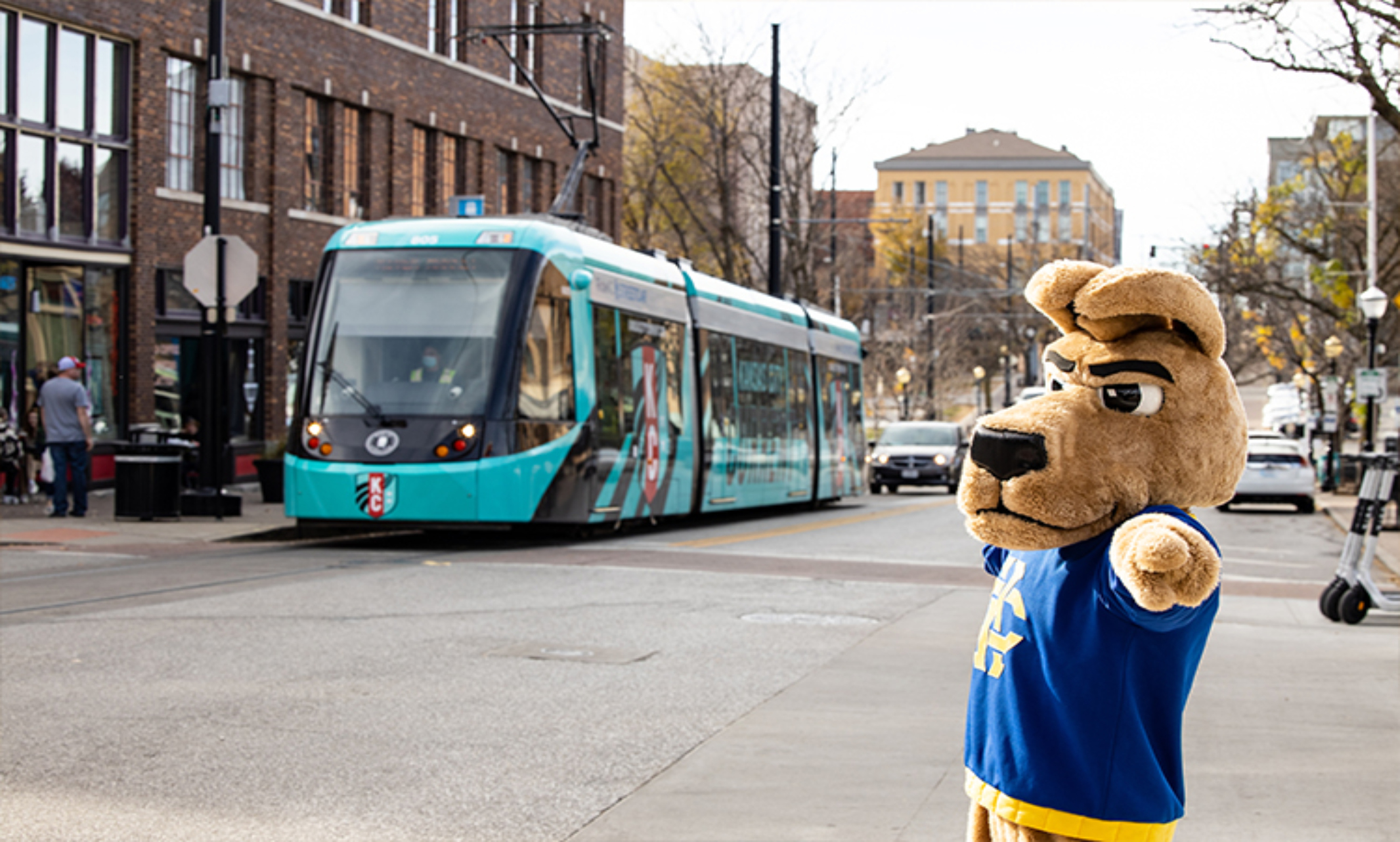
The city’s massive infrastructure project now underway will have a direct impact on UMKC
The city’s other massive infrastructure project now underway will have a far more direct impact on UMKC than the airport terminal. That project is the extension of the Kansas City Streetcar line to the Volker Campus, for which an official groundbreaking ceremomy was held on April 6.
The streetcar’s 3.5-mile southern extension along Main Street is a $351.7 million project with nine stations, transit signal priority and improvements to intersections and sidewalks. It will bring the line to the university’s doorstep at the intersection of 51st Street and Brookside Boulevard, providing fast, free transportation for the campus and community from UMKC to Berkley Riverfront Park. It will also provide easy access to Union Station, the Crossroads District, Downtown and the River Market.
The streetcar station’s proximity to the site once occupied by Oak Place Apartments has drawn heightened interest in a public-private partnership to develop the site. The university is currently assessing its needs and determining a timeline for future development at the streetcar terminus.
Additionally, a UMKC professor and several students had the opportunity to contribute ideas for the streetcar stop at the Volker Campus. Bill Yord, an adjunct instructor for the School of Computing and Engineering, also serves as senior project manager with the Kansas City Area Transportation Authority (KCATA) and utility manager with the KC Streetcar South Extension. He is also a UMKC alumnus (B.S.C.E. '01, M.S. '09).
Yord reached out to streetcar stakeholders about UMKC senior students assisting with designs for the streetcar's south terminus at UMKC. Students were asked to come up with design concepts for the UMKC streetcar stop project.
The extension is expected to open by 2025.
Apr 18, 2022
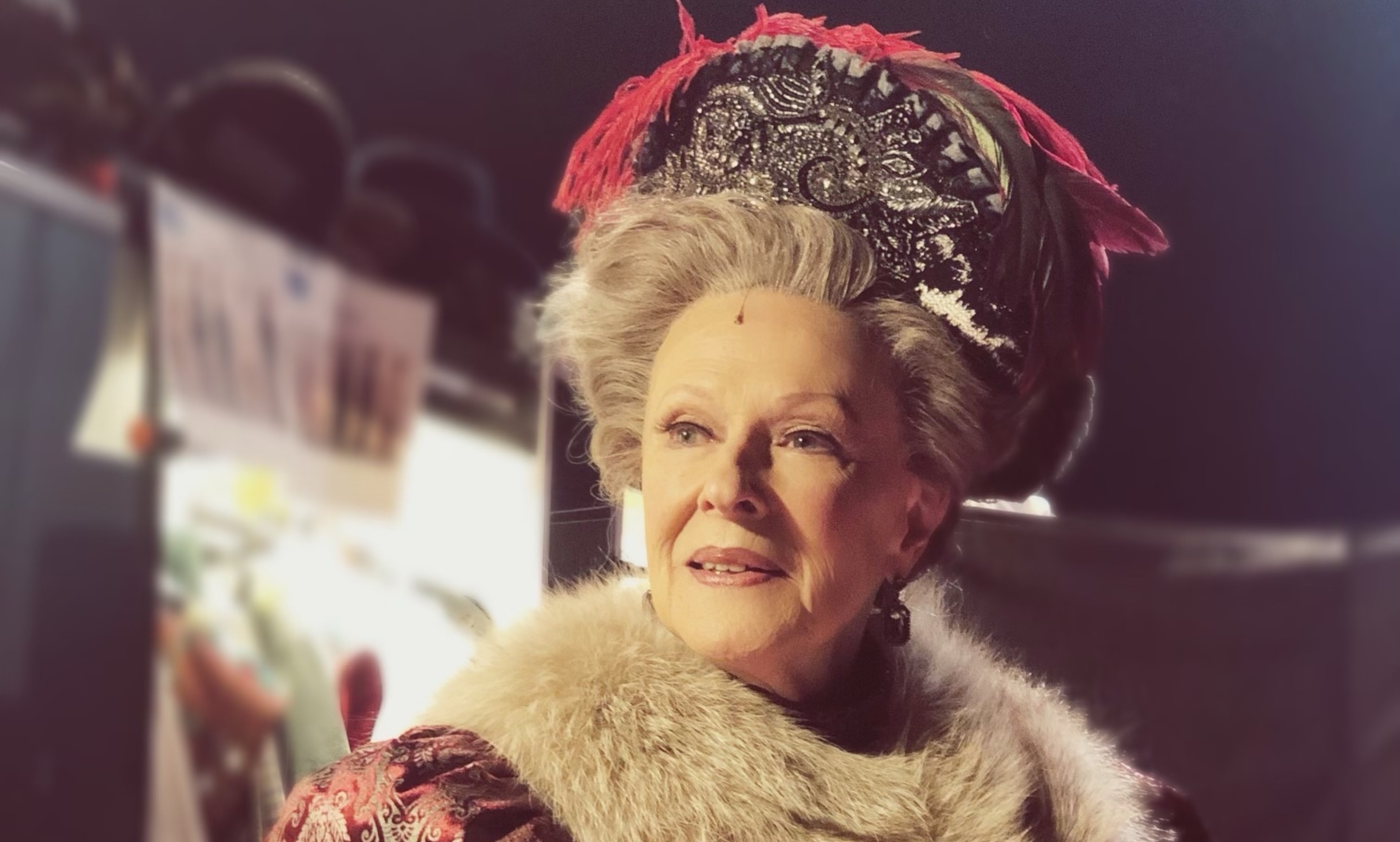
UMKC alumna Joy Franz (B.M. '64) has graced stages worldwide
Joy Franz’s (B.M. ’64) acting career has taken her all over the world. She’s performed on and off Broadway and in regional theater. She’s appeared in television and film and has even met two presidents — Harry Truman after being named Miss Independence and Jimmy Carter while performing in Hello, Dolly.
And yet, the UMKC alumna understands the importance of feeling at home. She carries out a couple traditions to ensure that’s the case.
When Franz, who has toured with productions such as Anastasia, Damn Yankees and The Sound of Music, goes on the road, she’ll bring along a double-burner, skillet and pot — insistent on making her own breakfast. She’ll purchase her favorite herbs and fruits, and she’ll even pick up some white biancas — her favorite flower— to fill her hotel room.
“It’s very important,” Franz says. “I make it like my home.”
Her actual home? That’s another story.
Nowadays, Franz lives in New York City, but her roots are grounded in the Greater Kansas City area, where she was known by a different name: Maybelle. Franz grew up in Overland Park, Kansas, before attending UMKC.
Some half-a-century later, Franz recalls the impact the university made on her career. She remembers the late professor Stanley Deacon helping her develop her voice and posture. She reminisces on conversations with Patricia McIlrath, a longtime chair of the UMKC Department of Theatre and founder of the Kansas City Repertory Theatre.
As far as Franz’s career has taken her, her roots in Kansas City have remained. It’s all part of the story of one of the most heralded theater performers to come through UMKC.
Finding Her Voice
As Franz recalls, she discovered her gift for singing in the fifth grade. She had performed in grade school but had no idea it would be her calling — at least until she was watching a television program hosted by Billy Graham and was captivated by a woman singing.
“I just had an epiphany,” Franz says. “I said, ‘Oh, that’s what I’m supposed to do in life.’”
Franz immersed herself in the arts, studying at the UMKC Conservatory and renting a room in a house just down the road. She spent large amounts of time at The Nelson-Atkins Museum of Art and swears there was a patch of four-leaf clovers she’d seek out if she were to return today.
“The museum is so wonderful,” Franz says. “Right there by the university.”
Then came the journey that helped her career take off. After attending UMKC (then the University of Kansas City) from 1960-64 — and spending a few summers performing at the Starlight Theatre at the same time — Franz drove to New York to dive into life as a performer.
Franz had only $500 — more money in 1964 than today, she reminds, but certainly not a fortune. After about a year and a half, she made it to Broadway. Her first show was Sweet Charity, which happened to be the first Broadway show she had ever seen.
In Sweet Charity, Franz worked with multi-time Tony winners Gwen Verdon and Hellen Gallagher. She was the understudy to Golden Globe-winner Ruth Buzzi, and yet she left the show she was “very fortunate and so grateful” to land after just three months.
“Most people don’t leave Broadway roles,” Franz says. “I just had to do bigger roles than being in the ensemble.”
Photo provided by Joy Franz
Taking the Stage
Among her many performing credits, Franz originated the role of — meaning she was the first to play — the evil stepmother in Into the Woods. She felt especially connected to characters she played in Driving Ms. Daisy (Daisy), Mrs. Warren’s Profession (Mrs. Warren), Man of La Mancha (Aldonza), Damn Yankees (Meg Boyd) and Steel Magnolias (Clairee).
For Franz, a major part of acting has been finding ways to relate to her characters. She enjoys playing humorous roles, and she enjoys the dramatic and aristocratic characters, too. Her most recent major theater role was as the Dowager Empress in Anastasia — the grandmother of the titular character who spends much of the production searching for her grandchild.
“You always find some aspect of yourself you bring to the role,” Franz says. “I just relate to almost all of the roles I’ve played.”
The exception? “Cutting off a toe or a heel,” Franz says with a laugh. (Her character, Cinderella’s Stepmother, does that in Into the Woods.) But the Dowager Empress was a particularly memorable character for Franz given the perseverance she showed in the story.
Franz shares a similar message.
“Never give up on your dreams,” Franz says. “Rejections, good Lord, I certainly have had some. Persevere. Perseverance. If it’s what you love more than anything — with your passion — and you believe in yourself, you will succeed.”
What Comes Next
So what is Franz up to now? Looking for her next role.
The COVID-19 pandemic cut the Anastasia tour short — “It was heartbreaking,” Franz says — but the reopening of Broadway has led to new opportunities. Last fall, Franz spent a few days filming a small part for an upcoming Judd Apatow film. Recording auditions is still very much part of her life, and she’s also made time to catch up on Broadway performances she couldn’t see in the past while she was on the road.
“Broadway is open again, thank God,” Franz says. “It’s thrilling.Getting on the subway and coming up and seeing all the lights on,… I’m very excited and happy for everyone.”
Apr 18, 2022
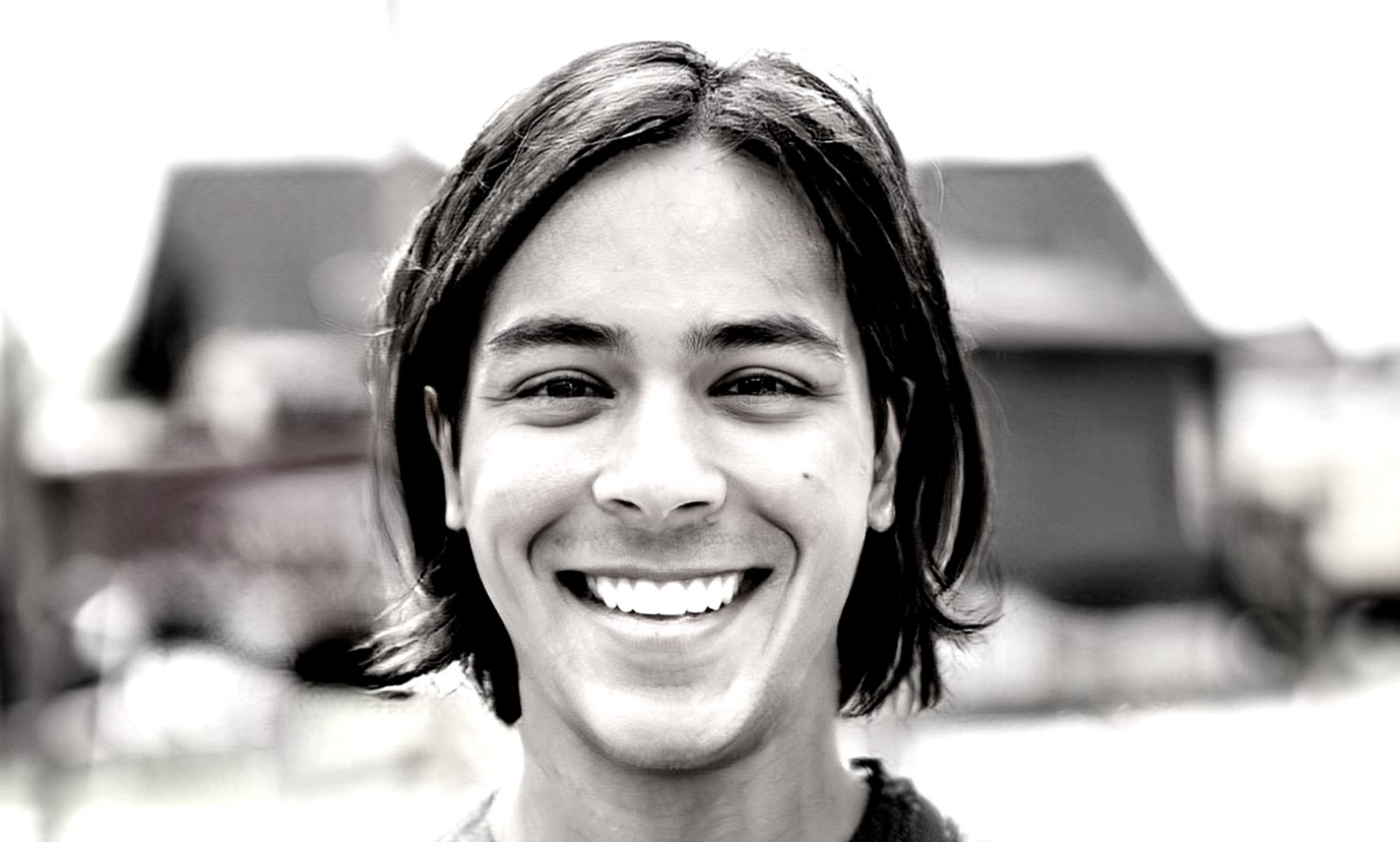
UMKC honors Riddhiman Das with Alumni Spotlight Award
Each year, the UMKC Alumni Association recognizes the achievements of outstanding alumni with an awards celebration. UMKC is honoring Riddhiman Das (B.S. ’12, M.S. ’19) with its Class of 2022 Alumni Spotlight Award. The Spotlight Award recognizes an alumnus whose accomplishments, leadership and public service have caused regional and national attention to be focused on the university and the metropolitan area.
Riddhiman Das’ love of technology started when he was five years old when his family got their very first computer.“I was immediately hooked. I was amazed at all the things this device could do, and quickly resolved to spending my life building in innovative areas of computer science & technology.”That is exactly what he has done as the co-founder of TripleBlind, a data security company that allows companies to securely transfer data to solve challenges in healthcare, finances and science without compromising privacy.
TripleBlind is said to be the product of groundbreaking innovation. What inspired you to create it?
As more and more of our information is stored and transacted within the digital world, as opposed to the analog world, the current approaches we take to ensure the privacy of these transactions fall short. I wanted to find a way to allow our collective data assets to be used to their fullest potential to solve real world health, financial and scientific problems, while at the same time ensuring that the regulations that govern them are enforced and privacy is intact.
What did you learn working with a large, international corporation? How is that different from a start-up environment?
The two experiences are very different, yet symbiotic. As the saying goes, the best way to compress 10 years of learning into two years is to work at a startup. I am a better start up executive because I have experienced the large company scenario. And because I started my career at fast-moving, innovative, high-tech startups, my ability to contribute to large companies was significantly enhanced by those experiences.
How did UMKC prepare you for/contribute to your success?
I really feel like the computer science program at UMKC is really underrated. It has a world-class faculty and research programs, and I got involved in a lot of extracurricular and co-curricular activities which really helped me develop into a well-rounded person. Because of the small class sizes, you get a lot of close attention from your professors and faculty. Also, the robust internship programs ensure that students are able to learn outside of the classroom in real-world situations as well.
What is your favorite UMKC memory?
I really like how involved the faculty was. Everybody knew me and took a personal interest in my learning and success. I spent many nights and weekends at school working on obscure projects with my professors and fellow students. On top of that, I also met my wife at UMKC and built some lifelong friendships.
What is your proudest accomplishment?
Being able to get TripleBlind from founding to being more than a $100 million company in less than two years has exceed my own expectations!
What advice do you have for students who’d like to follow in your footsteps?
A large part of the success in the early years of your career depends very much on what you know as well as who you know. So the most important piece of advice for folks earlier in their career is to start to develop a large network in your domain. Also, in the early years of your career, it's important to have a lot of breadth as much as is important to have a lot of depth. So, I'd encourage you to try new things and put yourself outside of your comfort zone more than you historically have.
About Alumni Awards
Join us in honoring Das and the other Class of 2022 awardees at an in-person celebration at 6 p.m. April 29, at the James C. Olson Performing Arts Center. To register, visit UMKC's Alumni Association website. If you are unable to attend the event but would like to donate to student scholarships, contributions can be made online.
Apr 18, 2022
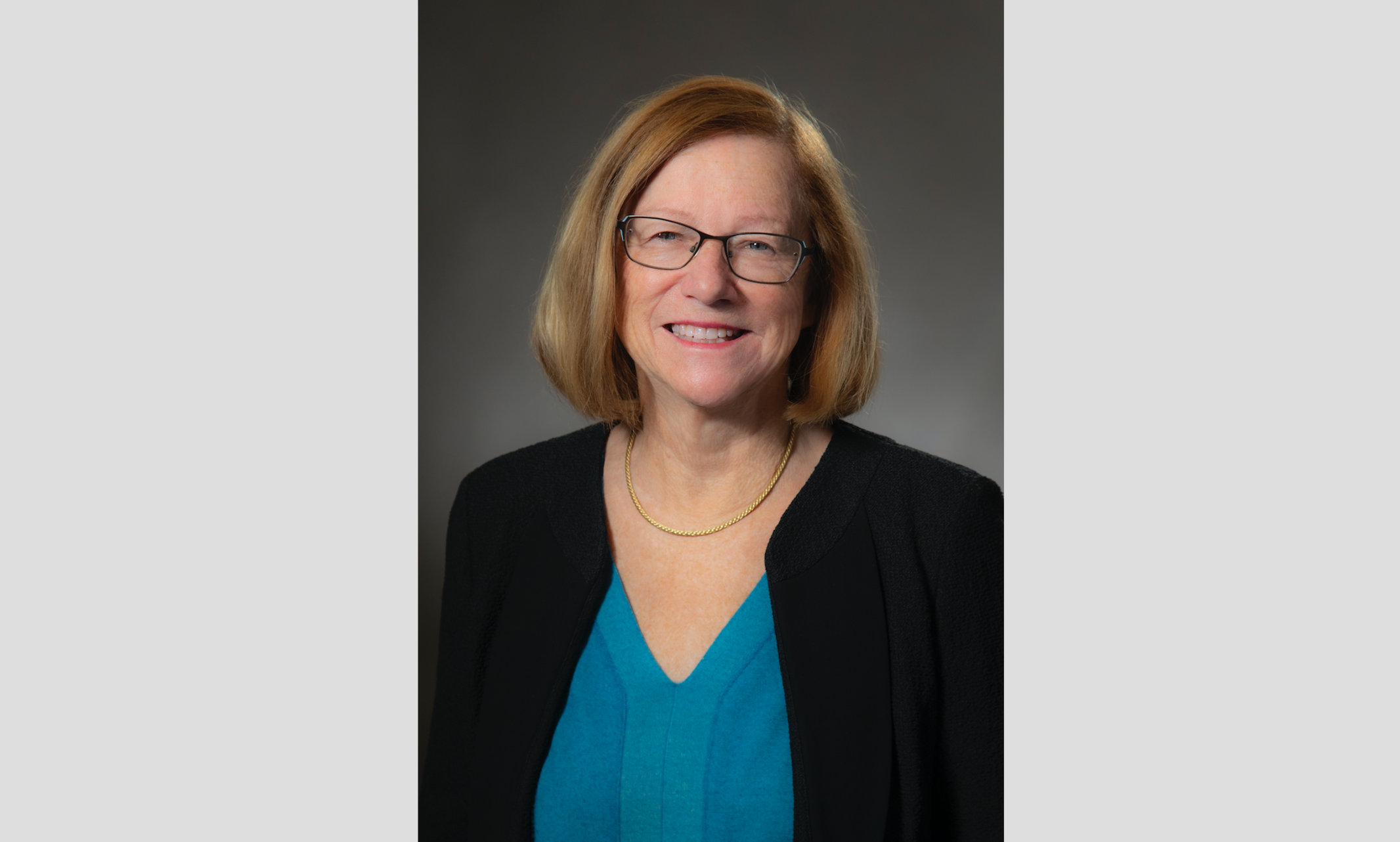
Judge Ann Mesle has demonstrated dedication to the legal profession and her alma mater
Each year, the UMKC Alumni Association recognizes the achievements of outstanding alumni with an awards celebration. UMKC is honoring Ann Mesle (J.D. ‘72) with its Class of 2022 Bill French Alumni Service Award.
Judge Mesle’s distinguished work for UMKC is the definition of service. She has served on the UMKC Law Foundation (President), as a UMKC Trustee, Martha Starr Education Fund (Co-Chair) and the Board of Diastole Scholars’ Center (Chair). She has received the UMKC Law Foundation’s Lifetime Achievement Award, its Alumni Achievement Award, and its Best Friend Award.
Mesle served for 13 years as a state trial judge, handling general civil and criminal trial dockets. She also served as an Administrative Judge for the Family Court for two years. Her service to the Kansas City bar is legendary. She has served on the boards of innumerable civic organizations, including Health Care/Health Forward Foundation (Executive Committee), Missouri Institute for Justice (Chair), Truman Medical Center Risk Committee, Jackson County Children’s Service Fund (Vice-Chair) and the Center for Conflict Resolution.
What causes motivate you and are close to your heart?
Central to my life’s worldview is a belief in human dignity, and respect for the earth and the creatures that share it with us.
How can young people make a difference in their communities?
We need a new generation of leaders and volunteers expanding their participation in our civic, governmental, non-profit and business activities. This is already happening and new leaders continue to develop.
What advice do you have for students who’d like to follow in your footsteps?
Students can learn from the successes and failures of earlier generations but no one needs to follow in my generation’s footsteps. We need UMKC students and graduates to apply their educations, their time and their talents to better our communities by following their own paths.
What inspires you to give back to UMKC?
There is not a day that I do not feel a depth of gratitude because UMKC Law School offered me the opportunity to get a legal education.
About the Alumni Awards
Join us in honoring Wilson and other Class of 2022 awardees at an in-person celebration at 6 p.m. at the James C. Olson Performing Arts Center. To register, visit UMKC's Alumni Association website. If you are unable to attend the event but would like to donate to student scholarships, contributions can be made online.
Apr 15, 2022
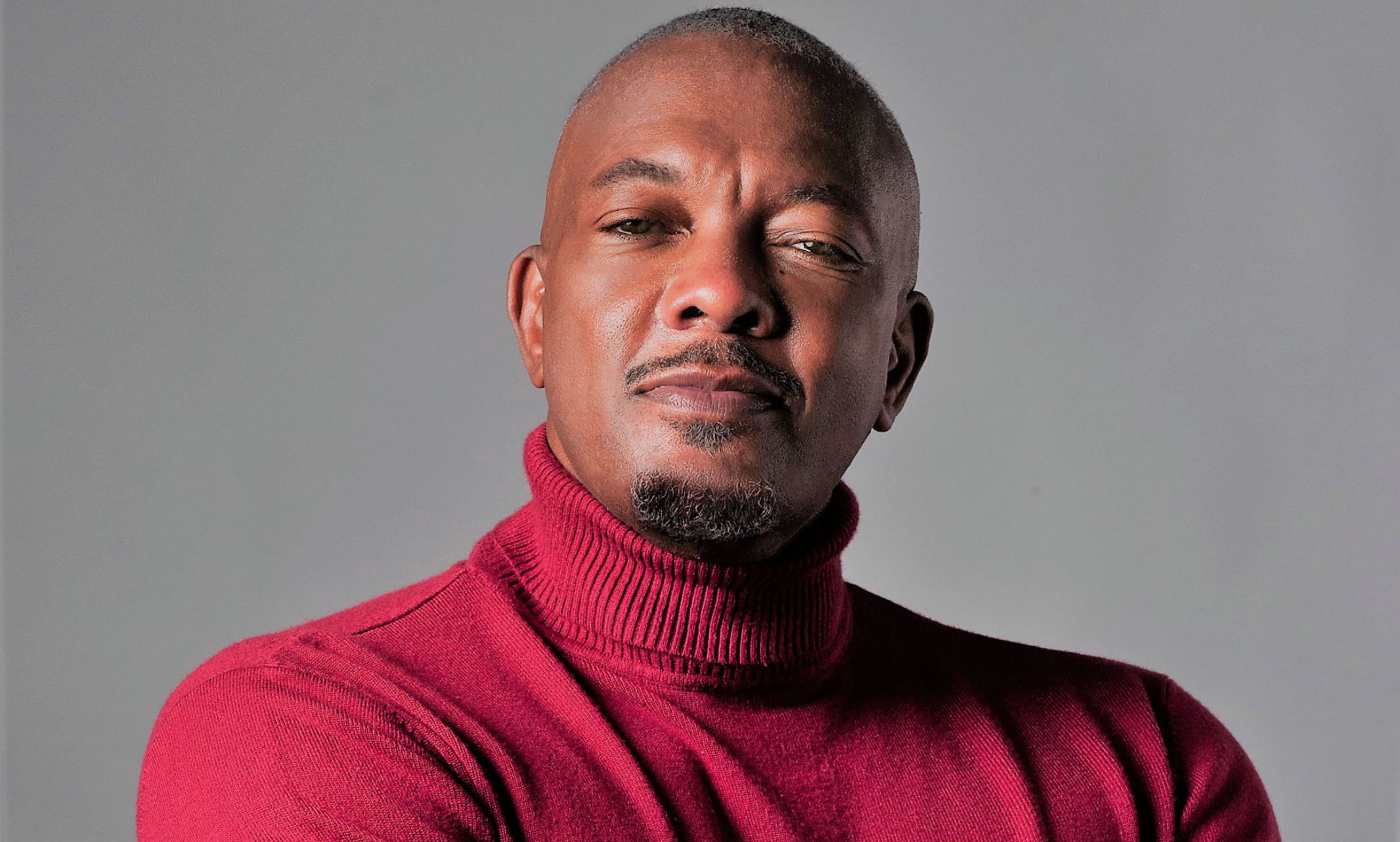
Gary Abbott, Professor of Dance, was honored with a Guggenheim Fellowship for choreography
UMKC Conservatory professor Gary Abbott has been awarded a 2022 Guggenheim Fellowship for choreography from the John Simon Guggenheim Memorial Foundation.
Abbott has taught modern dance at UMKC for 11 years. He has danced in and choreographed productions across the country and internationally. Abbott is also a cofounder of Deeply Rooted Dance Theater in Chicago, focused on diversifying contemporary dance by bringing together modern, classical and African American traditions.
“Being named a Guggenheim fellow feels like an affirmation of the work I’ve been doing,” said Abbott. “It’s given me energy to keep creating and reminds me that I’m doing this for more than just myself. I could never have created the work I have done by myself; it’s been the spiritual generosity of my family and friends that moved me to make dances.”
The Guggenheim Fellowship is considered a highly prestigious and competitive award. The Guggenheim Foundation received nearly 2,500 applications and selected 180 fellowships for the 2022 class. Abbott is the seventh UMKC faculty member to receive the fellowship while teaching at UMKC; he joins the late Michelle Boisseau (poetry, 2017), Elijah Gowin (photography, 2008), Christie Hodgen (fiction, 2011), Clancy Martin (fiction, 2011), James Mobberley (music composition, 1992) and Paul Rudy (music composition, 2008).
“Being named a Guggenheim fellow feels like an affirmation of the work I’ve been doing. It’s given me energy to keep creating and reminds me that I’m doing this for more than just myself." — Gary Abbott
The fellowship includes a monetary gift to complete a creative project. Abbott’s project will be centered around the prison system’s effect on the Black community; he first explored this subject when he created a dance titled, “Breaking the Dam: Mass Incarceration.”
“Gary’s gorgeous choreography and dance have long been known to the Conservatory and Kansas City, but his well-deserved Guggenheim Fellowship will allow people across the country to discover his artistry,” said Andrew Granade, interim dean of the Conservatory. “Gary’s Guggenheim is just another example of why the UMKC Conservatory is the place to study dance in the Midwest.”
“I’ve had the good fortune to work with so many brilliant artists,” said Abbott. “I’m constantly reminded that I work around and with some fantastic people.”
Apr 13, 2022
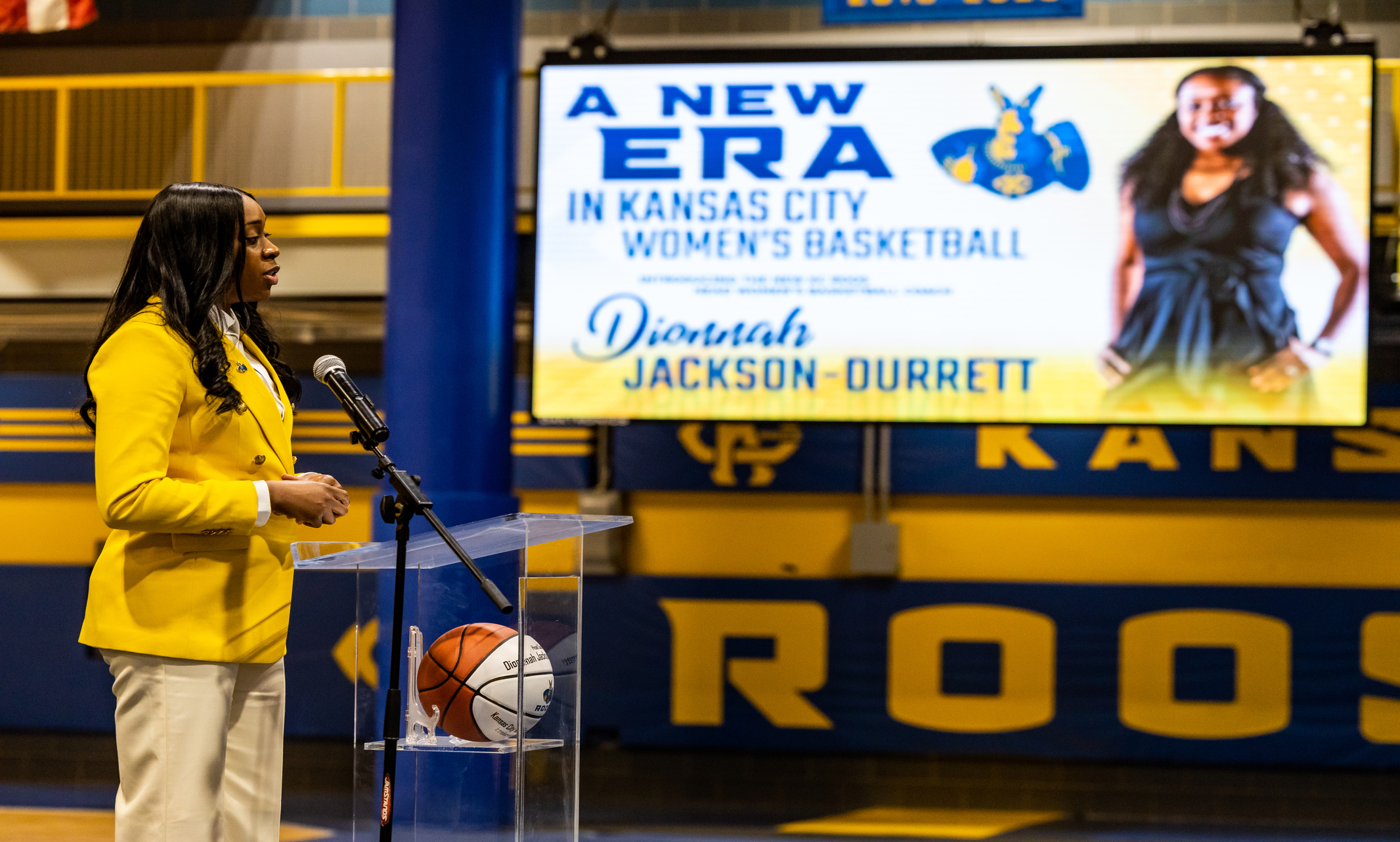
Dionnah Jackson-Durrett, a former first-round WNBA pick, served as the associate head coach at Texas over the past two seasons
Kansas City Athletics has named Dionnah Jackson-Durrett as the head coach of the UMKC Women's Basketball team. She was welcomed to campus on Tuesday.
Jackson-Durrett, a former first-round WNBA pick and one of the most highly touted assistant coaches in the nation, served as the associate head coach at Texas over the past two seasons and has coached in five consecutive NCAA Elite Eights.
"I'm honored and ecstatic to be a part of the Kansas City Athletics family," Jackson-Durrett said. "Throughout the process, the energy has been amazing and my decision developed organically. I'm supposed to be here, I feel it in my heart."
Originally from St. Louis, Jackson-Durrett has deep ties to basketball within Missouri and the Midwest at large. The 2001 Missouri High School Player of the Year put together an All-American career at Oklahoma before spending five years in the professional ranks.
"We are delighted to have Dionnah as part of our Kansas City family," said Vice Chancellor/Director of Athletics Brandon Martin. "Not only does she have impeccable integrity, her basketball acumen and coaching pedigree is unmatched."
Over the past 12 years, she has made coaching stops at Mississippi State, George Mason and Southeast Missouri State, in addition to her time with the Longhorns.
"As part of the UMKC family, Coach Jackson-Durrett will lead our women basketball players to be better athletes and fierce competitors," Chancellor Mauli Agrawal said. "Her past performance shows us that we can expect our women basketball players to thrive under her leadership. We are thrilled to have her here because we know she will emphasize, and exemplify, the importance of sportsmanship, giving back to the community and showing up for one another."
To read more about Jackson-Durrett, click here.
Apr 12, 2022
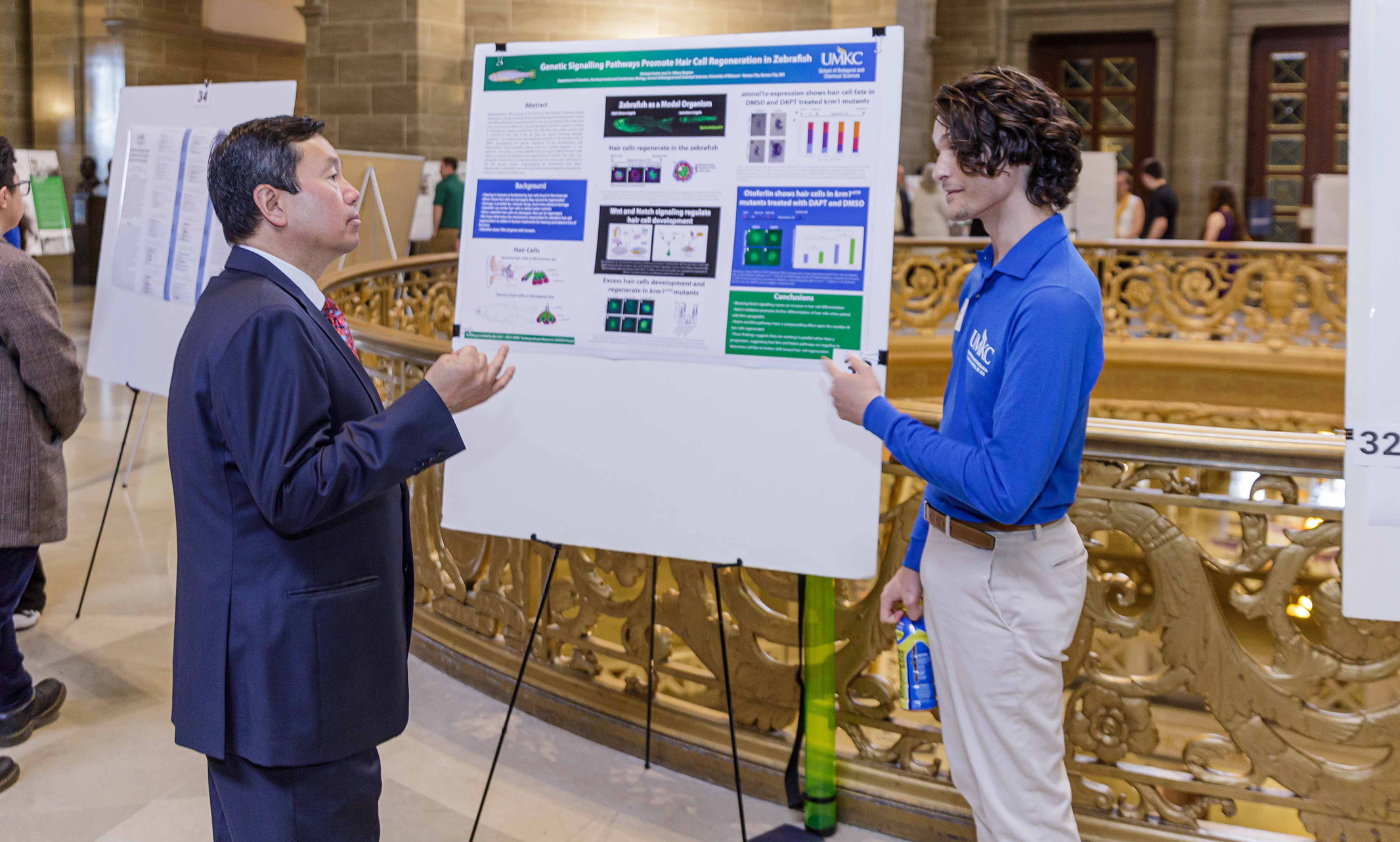
Students conduct research on cancer, jazz, earthquakes and more
After two years of virtual presentations, students from the University of Missouri-Kansas City presented their research in person at the State Capitol in Jefferson City.
The University of Missouri System Undergraduate Research Day featured ten UMKC students, presenting alongside students from the other three UM System schools.
This annual event at the Capitol is a single day devoted to demonstrate to lawmakers in Jefferson City, as well as the public, the unique opportunities undergraduate students have to participate in faculty-mentored research at the four UM System universities.
The featured research projects this year are:
Falls in Older Adults: Preventing Risks with Physical Activity and Cycling
Student: Victor Arellano
Faculty member: Dr. Joseph Lightner
In the United States, adults aged 65 or older (older adults) are at an increased risk of injury from a fall. Reducing an individual’s risk of falling is crucial to avoiding an injury or fatality. Arellano’s study aimed to compare the physical activity (PA) and balance of older adults who regularly cycled to older adults with little to no reported PA and the number of self-reported falls.
Arellano is studying public health.
Impact of COVID-19 Pandemic on Middle Aged and Older Adults’ Physical Activity Levels
Student: Maya Baughn
Faculty mentor: Dr. Amanda Grimes, Nursing and Health Studies
The purpose of Baughn’s study was to qualitatively explore the impact of the COVID-19 pandemic on middle aged and older adults’ physical activity nearly six months into the pandemic. Undergraduate students conducted interviews with adults aged 50+, asking how their activity was impacted due to the COVID-19 pandemic. Approximately 230 interviews were conducted with a diverse sample of participants from the Midwest.
Baughn is studying health sciences.
Xenolith Structures in Welded Basalt Agglutinate Associated with Dotsero Crater, Colorado
Student: Kyle Broley
Faculty mentor: Dr. Alison Graettinger, Earth and Environmental Sciences
The focus of Broley’s study was to gain a detailed understanding of the lava and sediment interactions that occurred at the Dotsero maar volcano in Dotsero, Colorado. These analyses provide answers to thermal impacts and deformation on the localized sediment pieces from the eruption event to gain a deeper understanding of the impacts to the surface sediments.
Broley is studying earth and environmental sciences
Reframing the Narrative: Uncovering Kansas City Women in Jazz
Student: Nina Cherry
Faculty mentor: Dr. Alison DeSimone, Musicology
The jazz canon, formed primarily by white, male scholars of the twentieth century, has neglected and trivialized the careers of women within the genre, especially instrumentalists. Cherry’s research project investigated the historically underrepresented and forgotten women in Kansas City jazz. These women were highly influential to the development of the region’s distinct style, which, in turn, greatly contributed to the city’s growth, although history texts do not reflect this. Her research has been used to create a database of Kansas City women in jazz, Countess.
Cherry is studying music theory.
Student Life Through the Art of Luis Quintanilla: A Study of the Murals in Haag Hall
Student: Victoria Dominguez
Faculty mentor: Viviana Grieco, History; Latin American and Latinx Studies
Dominguez’s research focused on Dr. Clarence Decker’s, President of the University of Kansas City (now UMKC), efforts at broadening the academic scope of the university by appointing prominent international figures to the faculty, like Luis Quintanilla, who established the first fresco painting school in the United States as a resident professor. Dominguez finds her research relevant to Missourians as it shows how higher-education institutions promote cultural engagement through students’ activities within and outside the classroom.
Dominguez is studying spanish and sociology.
The Importance of Yeast in Cancer Research
Student: Jordy Hernandez
Faculty member: Dr. Saul Honigberg, Biology
Hernandez’s research focused on three yeast cyclins, proteins associated with the cycle of cell division, and determining whether mutants in these cyclins affect surrounding cells as well as the cell containing mutations that can form cancer. Yeast is a useful model for cancer cells because it has a short generation time, shares many biological properties with human cells and is relatively simple to genetically manipulate.
Hernandez is studying biology and chemistry
Hair Cell Regeneration in Zebrafish
Student: Michael Kuehn
Faculty mentor: Dr. Hillary McGraw, Biology
In the ear, specialized cells, called hair cells, sense sound. When hair cells are damaged, they fail to regrow, resulting in hearing loss. Aquatic animals have hair cells that sense water current, and in contrast to hair cells in the human ear, they can regrow following damage. Kuehn is investigating the genetic regulation of hair development and regeneration using zebrafish as a model organism. Understanding the mechanisms that allow regeneration in zebrafish hair cells could help human treatment research for hearing or balance function loss.
Kuehn is studying biology and chemistry.
Building a Georeferenced Database for the 1976 Guatemalan Earthquake Rupture of the Motagua Fault System along the North American-Caribbean Plate Boundary
Student: Trenton McEnaney
Faculty member: Dr. Tina Niemi, Earth & Environmental Sciences
In this study, McEnaney sought to relocate sites along the 1976 Motagua fault rupture by analyzing archival material from George Plafker of the U.S. Geological Survey, who was part of the team that collected data on the effects of the earthquake within days of the event. Prior to this project, locating any of these past field sites and points of interest along the 1976 Guatemalan earthquake rupture was hindered by the lack of GPS coordinates. The new database will benefit future paleoseismic and seismic hazard analyses research.
McEnaney is studying earth & environmental science with a geology emphasis.
How Stress Level and Coping Styles Impact Eating Decisions
Student: Grace Nanney
Faculty member: Dr. Oh-Ryeong Ha, Psychology
Nanney’s research analyzed the relationship between problem and emotion-focused coping styles and eating behavior. Participants rated foods based on taste, health, preference and consumption using a computer food rating and choice task and completed a self-report measure concerning factors associated with eating behavior. Participants then completed a self-report measure that ascertained their preferred coping style.
Nanney is studying psychology.
Apr 12, 2022
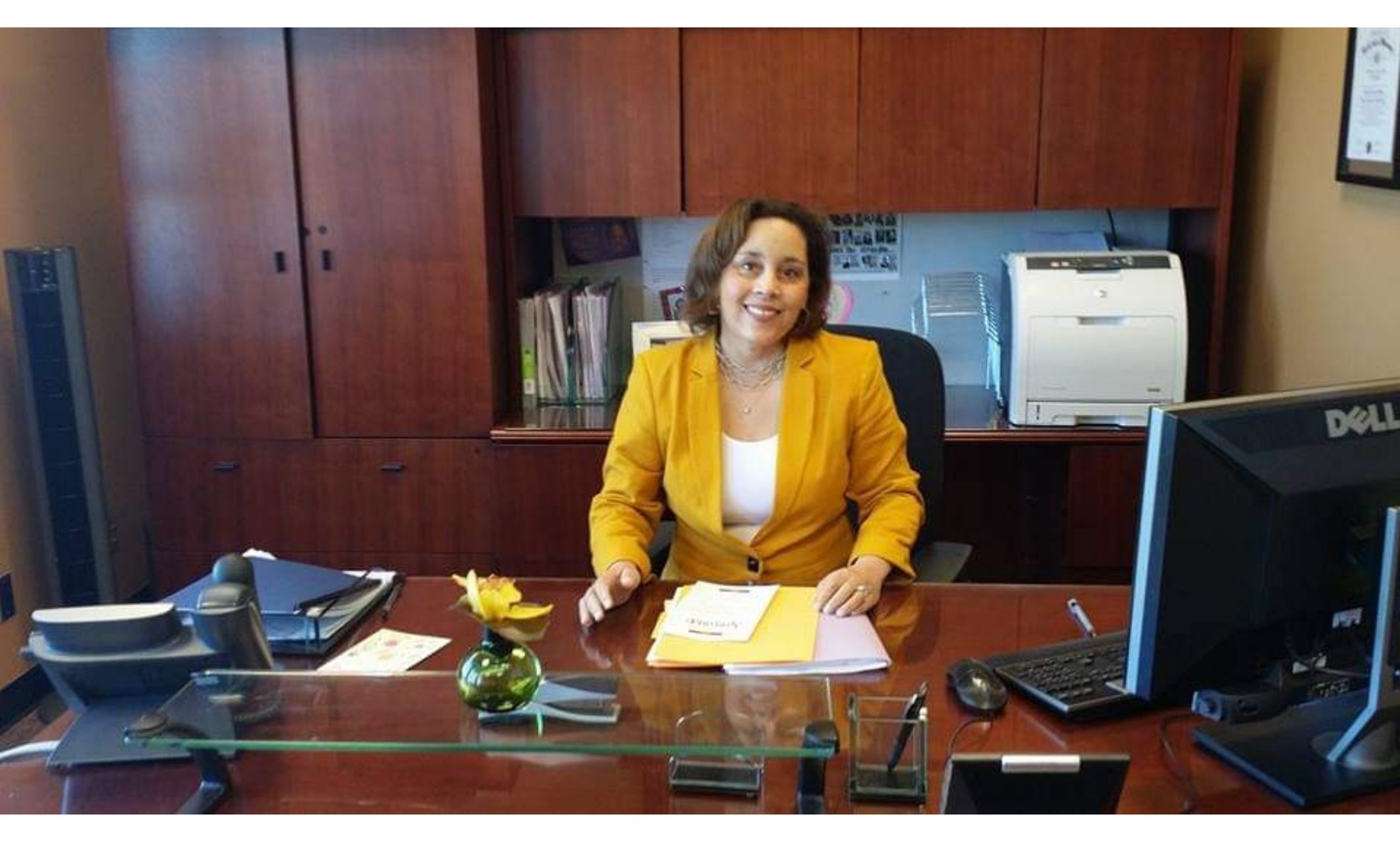
UMKC Alumni Association selects Susan B. Wilson to receive Campus-wide Alumni Award
Each year, the UMKC Alumni Association recognizes the achievements of outstanding alumni with an awards celebration. UMKC is honoring Susan B. Wilson, Ph.D. (MBA ’05) with its Class of 2022 Defying the Odds Award.
Pittsburgh, Pennsylvania native Susan B. Wilson, Ph.D., has always valued education, diversity and community service. Wilson’s childhood sparked a drive to excel and give back to create opportunities for others.
Wilson went on to earn her bachelor’s, master's and doctorate degrees. She has built a successful career using her educational background and go-getter attitude to excel in fields related to diversity and inclusion and is well respected among many in her field, but her path to greatness has been filled with hurdles and obstacles, a true testament to Wilson’s character and determination.
How have your personal experiences contributed to your drive to give back and support others?
I grew up in a black community that was rich in caring although poor in resources and decent housing. I had many struggles growing up, but there were always 'angels' who appeared to help when I least expected it. I always vowed to give back — to become the 'angel' that others were for me.
My father had an 8th-grade education but was self-taught and an avid reader. He stressed the importance of education so that I would have a better life than his own. I also think my family situation contributed to my lifelong interest in diversity and inclusion. I came from a very diverse family. My father was African American and spoke fluent Yiddish. My mother was Italian. Watching my mother and father bridge their cultural gaps was quite interesting and as a result, I became someone who could see both sides of an issue or argument, striving to be a mediator and one with understanding and insight.
What motivated your decision to continue with your education in an MBA program?
As early as graduate school, my knack for 'running things' was recognized when I was chosen to be the director of the psychology training clinic. After practicing for a while, I realized that behavioral health administration was a calling. I learned the business of behavioral health on the job, after leading clinics, clinic networks, clinical operations and a large urban community mental health center. Yet there were those who said “She’s just a psychologist, what does she know about business?" My decision to attend the Bloch Executive MBA program was motivated by my wish to deepen and broaden my existing knowledge of business. The Bloch School provided me with an excellent education that has served me well in a number of endeavors, including diversity and inclusion.
What is your proudest accomplishment?
Although I hold four degrees, my proudest accomplishment is motherhood. I was able to raise – by myself – a daughter and a son who are strong, smart and capable individuals that have a strong moral compass. I am also proud that I was the first person in two generations of my family to attend college. And although my work has brought me awards and recognition, I am most proud of saving lives through psychotherapy (like former Chief player Ryan O’Callaghan) and touching lives through mentoring, coaching and leadership.
What advice do you have for students who'd like to follow in your footsteps?
Keep your mind and options open. Some of us continue working within the settings and fields that call out to us when we are in school. However, many of us will find an entirely different setting or population to pour our passions into. Second, compassion fatigue is a very real thing. Don’t let your pursuits in the healing of others take you along with it. Take care of yourself. Your clients will thank you for it.
About the Alumni Awards
Join us in honoring Wilson and other Class of 2022 awardees at an in-person celebration at 6 p.m. at the James C. Olson Performing Arts Center. To register, visit UMKC's Alumni Association website. If you are unable to attend the event but would like to donate to student scholarships, contributions can be made online.
Apr 11, 2022
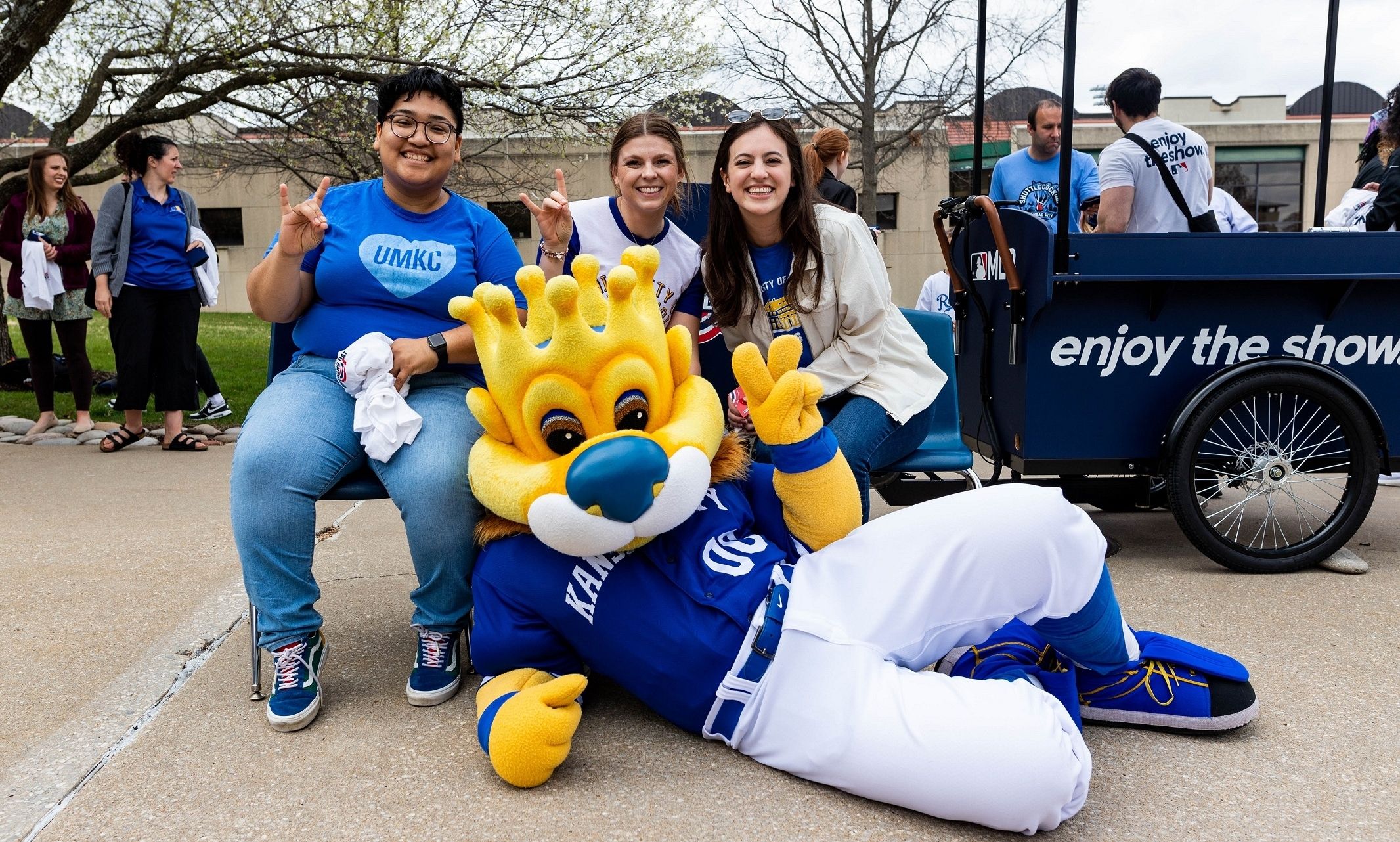
MLB Opening Day brings royals greats to campus
We were thrilled to host the MLB's Road to Opening Day with the Royals Tuesday, April 5. Students, faculty, staff and community members hung out with Sluggerrr and Royals greats, including Brian McRae, Jaime Bluma, Al Fitzmorris, Dennis Leonard, Jamie Quirk, John Wathan, Jim Eisenreich, Frank White and Greg Pryor.
Photo by Brandon Parigo
Photo by John Martellaro
Photo by Brandon Parigo
Photo courtesy of Frank White
Photo by Brandon Parigo
Photo courtesy of Frank White
Photo by Brandon Parigo
Photo by Brandon Parigo
Apr 08, 2022
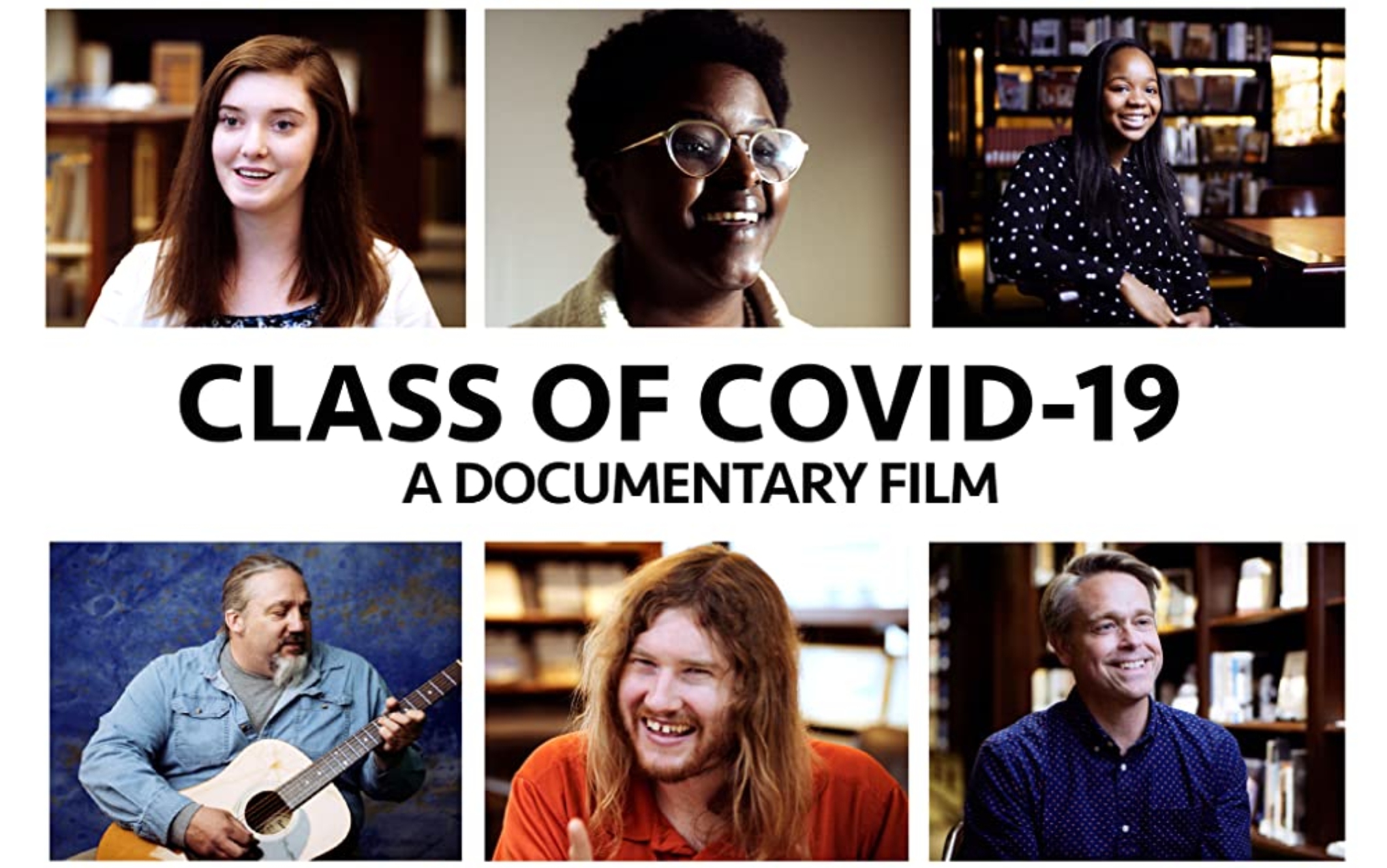
Documentary created by UMKC professor included in KC Film Fest
Street demonstrations for racial justice. Zoom classes. Conflict between school nurses and parents over virus precautions. School was a unique experience for the “Class of COVID-19.”
And that is the title of a new documentary film launched by Donna M. Davis, Ph.D., UMKC professor in the Department of Educational Leadership, Policy, and Foundations, that she hopes provides a window into that experience. As the 2020 president of the Organization of Educational Historians, Davis needed to deliver a presentation at the group’s annual meeting. She thought making a mini-documentary might be more interesting.
“At first, I wanted to make a short film around the work of high school history teachers in the era of ‘fake news’ and social media for my presidential address,” Davis says. “I contacted [filmmaker] Jon Brick and he was on board right away.”
The pair began filming interviews with local teachers. Soon after, the Covid-19 pandemic hit, and schools began to close, and the focus of the project quickly changed. Initially, Davis, Brick and their subjects thought the shutdown would last a few weeks.
“We were filming early in the pandemic, so we had those initial reactions,” Davis says. “Then we moved to Zoom interviews.”
As shutdown extended into summer and the Black Lives Matter demonstrations, the pair decided to interview high school students for their reactions.
“The project exploded from there,” Davis says. “And we began to focus on students and teachers with the most compelling stories.”
“We were filming early in the pandemic, so we had those initial reactions.” — Donna M. Davis
Brick says the people who participated in the interviews were very transparent about the level of stress and anxiety they were feeling.
“They talked to us about it, but they also made video diaries. Teachers talked to us about the demands of teaching, and students told us what it was like to be a freshman in college and be in a dorm room all alone day after day.”
They filmed interviews of school administrators and nurses, who told them how abusive parents could be in the face of their frustrations.
“We were able to talk to the head of health services at Shawnee Mission School District and heard stories of the challenges that the school nurses went through and how just how awful they were treated at times by parents who were just upset with the news that they were having to deliver,” Davis says. “It was really eye opening.”
Brick says one of his biggest surprises was the disparity between the wealthy schools and the those in the urban core and how much better many students from poorer districts managed the transition.
“I really felt as if the kids at Schlagle High School in Kansas City, Kansas had an edge, because they have struggles every day. They just put their heads down and worked.”
One student at Schlagle picked up a job at Chick-fil-A to pay for Wi-fi for himself and his five siblings.
“The family had a hotspot at home, but it couldn’t support the demand of six devices,” Brick says. “Sometimes he rode his bike and sat outside Schlagle to feed off their Wi-fi. He just wanted to graduate so badly so he could pursue his passion of becoming a baker.”
Regardless of individual viewers’ personal experiences, Davis and Brick think everyone will identify with the characters in their film.
“The film really showcases how teachers on every level shifted, and even if they had their own personal struggles, put on a brave face for the kids and made it work,” Davis says.
“Class of Covid-19” will air at the Kansas City Film Fest International April 26, 2021. Tickets are available online.
Apr 07, 2022
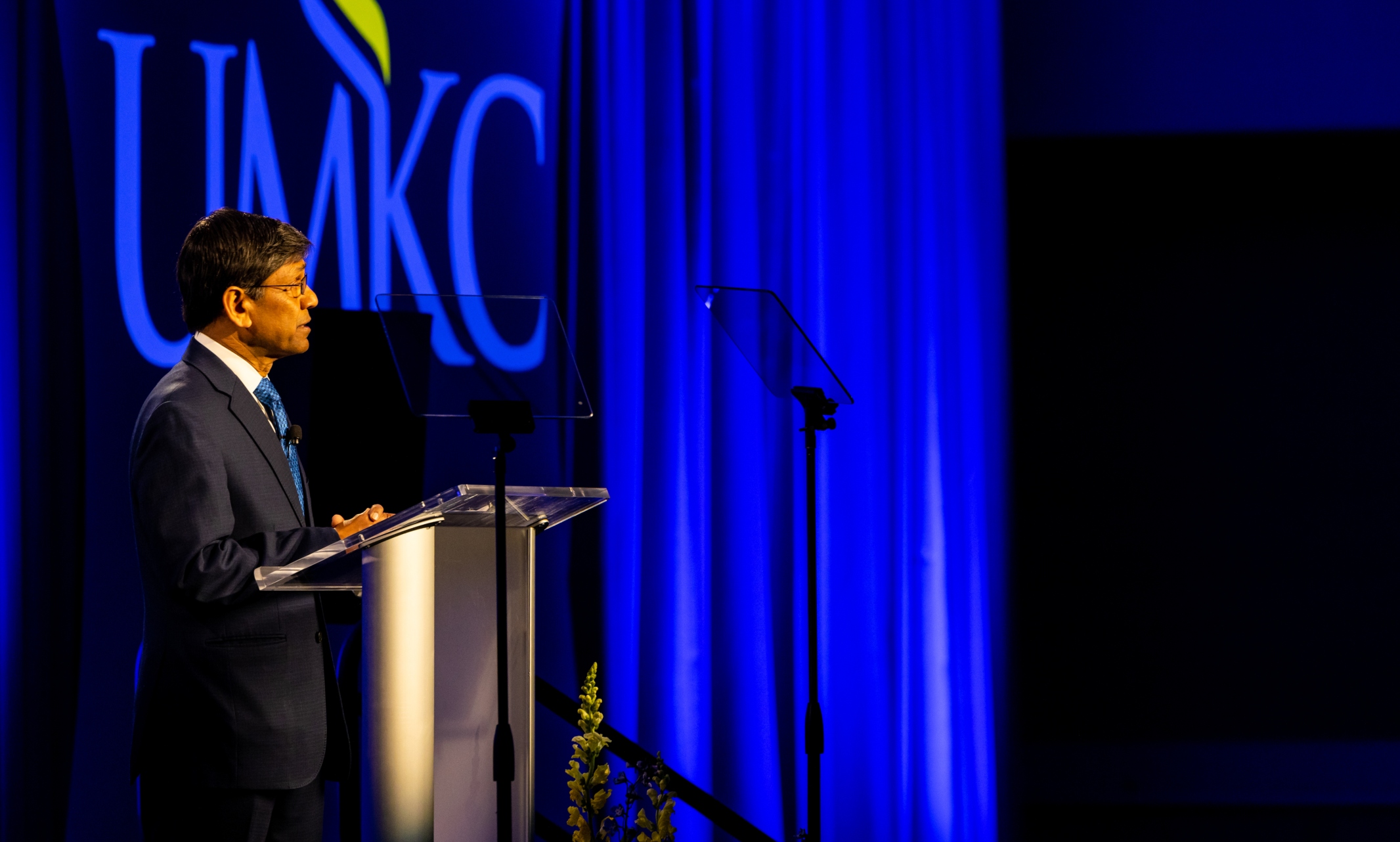
UMKC Chancellor Mauli Agrawal provides vision for growth
The University of Missouri-Kansas City has emerged from two years of challenges stronger and with a clear vision for the future that includes significant strategic investments in student success, research excellence and employee pay, as well as a focus on expanding and improving key campus facilities, Chancellor Mauli Agrawal said in his 2022 State of the University Address.
Agrawal said the university community has persevered through exceptional challenges, achieving success while demonstrating impressive resilience. He shared a wide-ranging vision for the university’s future that includes hundreds of millions in investment in new construction, renovation, salary increases, research and faculty support, and a unique new student success program designed to move students seamlessly from enrollment to professional careers.“We stand rooted and ready to build on our stable foundation, to escalate the success of our students, our research, our future and the prosperity of this community,” Agrawal said.
Seven Key Takeaways from the Address
1. Transforming the higher education model to promote student success
Student success is at the center of UMKC’s mission and its strategies for delivering excellent education. This fall, UMKC will welcome the first cohort of more than 100 students to the new Professional Career Escalators program, which combines classroom instruction with mentoring from community-based professionals, leadership skills training, intensive advising and applied learning opportunities. Career Escalators transforms the higher education model, by shifting the focus from degree attainment to career readiness, with an ultimate goal of propelling graduates to a good-paying job in the profession of their choice.
Agrawal also touted the success of First Gen Roos, a new program that launched in 2021 with 100 percent first semester student retention and higher than average GPAs when compared with other first-generation college students who did not participate in the program.
2. Growing UMKC research in size and impact
The university’s growing research enterprise helps drive huge leaps in human potential.UMKC received more than $54 million in external grants in FY 2021, a 10% increase over the prior year. With three months still to go in FY 2022, UMKC has already surpassed $74 million. UMKC research excellence covers an amazingly wide spectrum overall, from the Urban Education Research Center, and its vital efforts to bring positive change to under-resourced schools and neighborhoods; to the Midwest Institute for Defense and Energy, developing high tech solutions to our most challenging problems in areas ranging from national defense to agriculture.
3. Expanding the vision for the UMKC Health Sciences District
The vision begins with a new building that would house state-of-the-art dental teaching clinics and expanded medical school teaching facilities, projects that would meet significant health care needs for Kansas City and the state of Missouri. UMKC has asked state leaders for $50 million in state funding and would provide matching private funds. The new building would be a spark for an expansion of the entire UMKC Health Sciences District that could dramatically expand health care in Kansas City, attract top faculty and researchers and new private investment that could create new jobs and contribute billions to the Kansas City economy.
4. Investing in our people
Chancellor Agrawal said the university will invest $1 million in the coming year to address salary compression among faculty and staff. Ongoing efforts to increase pay for all graduate assistants will continue, including an additional $1 million this year for stipend support for doctoral and MFA students on graduate assistantships. He also made a commitment to bridge the financial gap for Pell-Grant-eligible students to cover their unmet need, essentially giving them a full ride to UMKC. Beyond that, he set a long-term vision of increasing pay for faculty and staff at UMKC. The centerpiece of that vision is a $315 million investment over 10 years – contingent on enrollment growth – in impactful merit-based salary increases and hiring additional faculty and staff.
The key to making it work will be meeting a target of increasing overall enrollment by an average of two percent per year over the next decade. To drive that growth, the Chancellor announced a commitment to match recruitment staff levels of peer institutions by adding five additional recruiters.
5. Creating a profound and powerful economic impact
UMKC generated almost $600 million in overall economic impact in Missouri during fiscal year 2021, according to a recent study conducted by a nationally recognized firm. In addition, the university generates more than $33 million in state and local taxes. More than 44,000 UMKC alumni live and work in Missouri, generating an additional nearly $8 billion in overall economic impact.
6. Transforming campus spaces indoors and out
UMKC has embarked on several projects to update and transform its facilities and outdoors spaces. Those include:
A $13 million renovation and expansion of Bloch Heritage Hall to incorporate state-of-the-art technology and create a hub for student engagement.
A $4 million project to renovate recital venues such as White Hall and Grant Hall, as well as improving arts practice and teaching areas most needed by our Conservatory students and faculty, as a first step of many to achieve our facilities vision for our world-famous school of music, dance and theater.
A $15 million federally funded project to significantly expand the new medical school program in St. Joseph.
Moving the Roo Pantry from its location on Troost Avenue to the first floor of the Student Union to be more accessible to students, and offer expanded services to address housing and other basic needs
In addition, the campus is working to further projects from its 2021 master plan that will make the campus more walkable and connected to the community. The university is working with the city and the Kansas City Streetcar Authority for the streetcar stop that will extend free, public transportation right to the UMKC front door at 51st Street and Brookside Boulevard. A couple of blocks further east, UMKC is working with the city on the process to begin construction to close 51st Street between Rockhill Road and Cherry Street to traffic, to make the campus more inviting, more welcoming and more walkable.The university also is beginning work to explore an expansion of Swinney Center to meet student needs for more recreational space and a larger venue for concerts, events and convocation.
7. Focusing on progress and respect for all in our diverse community
UMKC has responded to the call for campus to do more to reflect the contributions and increase engagement with our students of color and with our outreach to communities of color. On the campus front, recent developments include developing the Men of Color Academy, the creation of the Divine Nine Gardens and banners featuring the university’s National Black Pan-Hellenic Council leaders on the outside of the Student Union. A new Faculty Search Support Team will ensure inclusivity in faculty recruitment.
An example of campus outreach: Jannette Berkley-Patton, Ph.D., leads an important program combining research with community outreach, the Institute for Health Equity. Her team is partnering with Jackson County, local churches and businesses to develop solutions and bring better, more equitable health care to our eastside communities.
A look back at where we’ve been
Apr 07, 2022
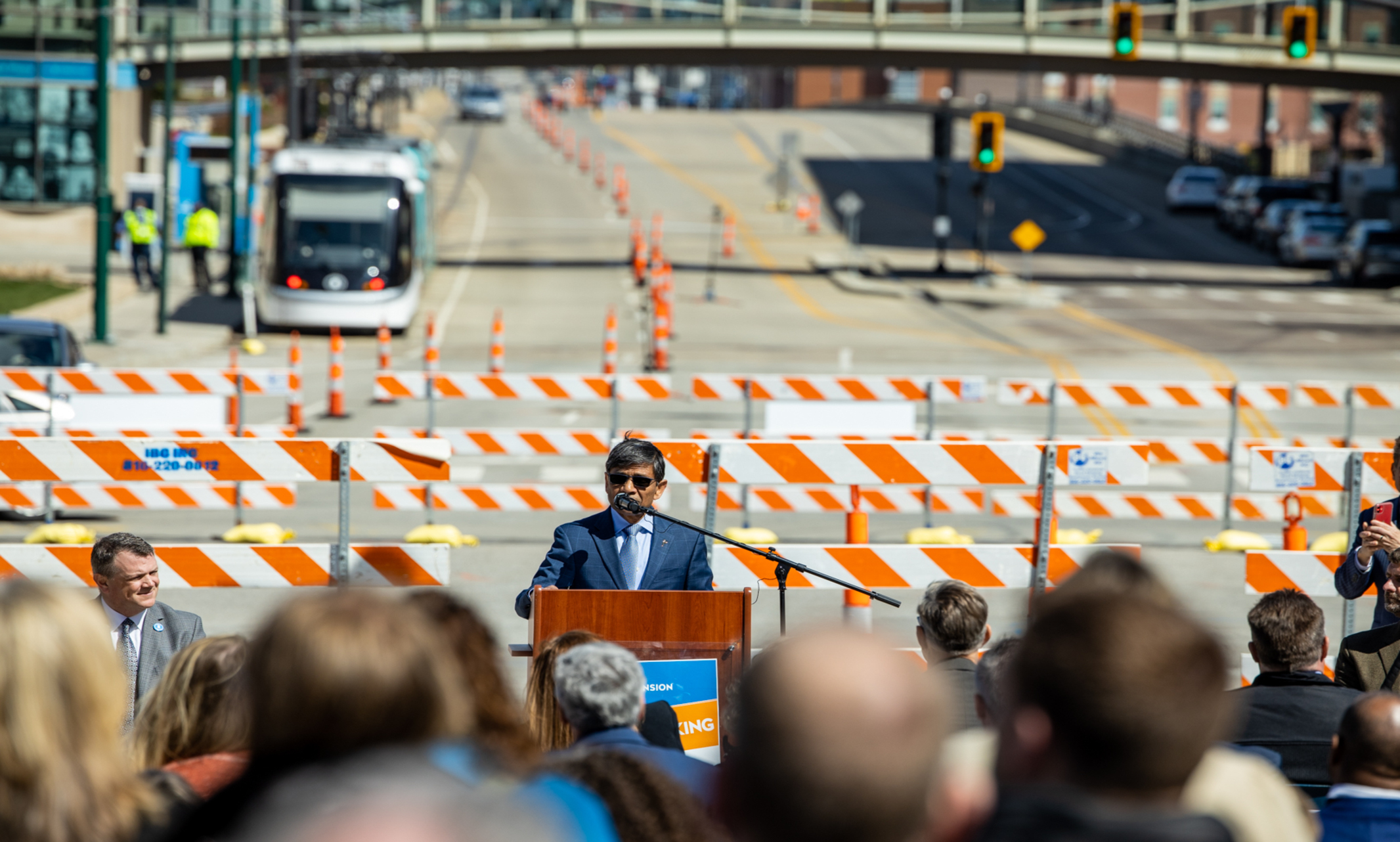
The project will provide enhanced access between UMKC and the Kansas City community
Construction on the new KC Streetcar extension project broke ground on Wednesday. The project will provide enhanced two-way access between UMKC and the Kansas City community, extending the existing Streetcar route from the River Market straight to UMKC’s doorstep.
“The extension of the Kansas City Streetcar to our doorstep will take things to another level entirely. As the new southern destination for this ultra-modern system of free public transportation, UMKC sees endless possibilities for the university, and the community it serves,” UMKC Chancellor Mauli Agrawal said at the event.
Agrawal spoke at the groundbreaking alongside Kansas City Mayor Quinton Lucas, Nuria Fernandez of the Federal Transit Administration and Tom Gerend of the KC Streetcar Authority. More than 100 community members and stakeholders were in attendance.
“The streetcar extension will boost the university’s visibility dramatically when we become a major boarding and existing site for the region’s most popular transit system. We anticipate that streetcar access will build a whole new population of people discovering – and taking advantage of – the many ways they can partner with UMKC,” Agrawal said.
The extension project, which has gone through planning and design by city officials since 2017, will cover more than 30 city blocks and will extend the existing 2.2-mile ‘Starter Line’ to the UMKC Volker Campus.
The UMKC Streetcar stop will be at 51st Street and Brookside Boulevard. The stop, which was unveiled at the event, will feature a large overhang with benches, a map of the streetcar’s route and plenty of room for standing.
“The streetcar will deliver people to outstanding music, dance and theatre performance by the faculty and students of our Conservatory; to medical services such as our dental clinic; to our signature events such as the Martin Luther King Jr. and Cesar Chavez lectures; to our KC Roos NCAA Division I sports program; performances at the Kansas City Rep; and so much more,” Agrawal said.
The extension project, and the opening of the new UMKC Streetcar stop, is projected to be completed sometime in 2025.
Apr 06, 2022
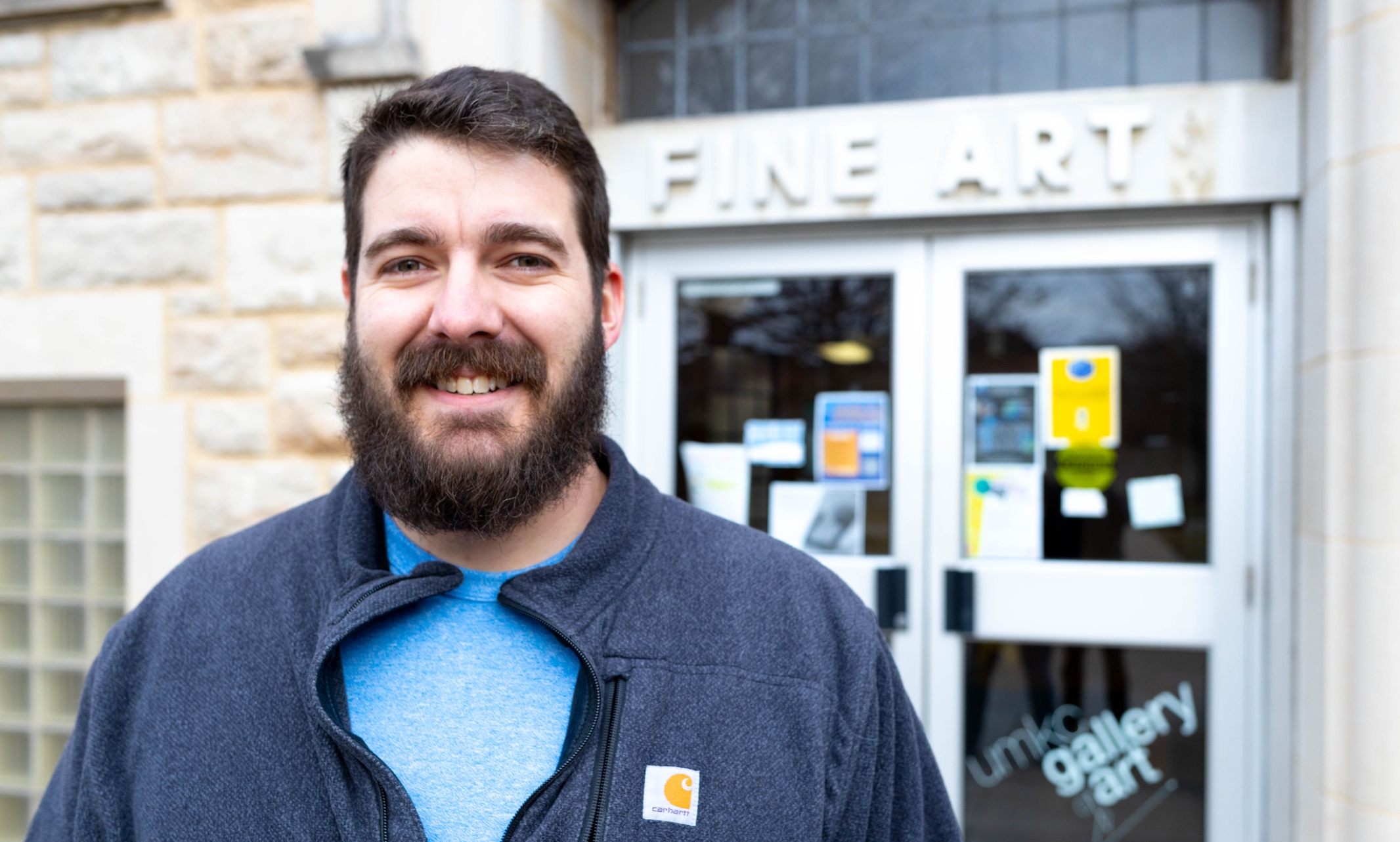
Eric Quinones is pursuing an art degree after serving in the Air Force
Roos don’t just dream, they do. Our students turn ideas into action every day. Get to know our people and you’ll know what UMKC is all about.
Eric Quinones '23Anticipated graduation year: 2023UMKC degree program: B.A. studio artHometown: Independence, MO
After seven years serving in the military, Eric Quinones from Independence, Missouri, is on a new path. The junior in studio art is pursuing his dream of becoming a video game designer and exceeding his own expectations along the way.
Why did you choose your field of study?
I hope to utilize my degree to get my dream job, which is a video game designer. I chose my field of study (studio art) because it helps me gain a leverage on becoming a video game designer as far as putting the art in my background and in my portfolio to design more intricate stuff.
Quinones said studying at UMKC has allowed him to explore new mediums of art
What inspired you to pursue video game design?
I’m an avid gamer and I enjoy video games. I wanted to create a video game of my own that would have good storytelling and drama rather than just guns and swords and killing. So the art is art of the gaming itself. Creating visual art within a 3-D world that doesn’t exist.
What are the benefits of the program?
The benefits of the program are to build up a portfolio, as well as building up your art background to find out what kind of art styles you like, whether it’s painting, drawing or photography. UMKC has great faculty.
Since entering college, what have you learned about yourself?
I’ve learned that I can achieve more than what I thought. I’ve never been very good at school, but now that I’m in college, I’ve passed my first two years and I’m working on my third year, which is beyond my comprehension of what I used to be.
Do you have any scholarships? What do they mean to you?
I have the GI Bill. I was in the Air Force from 2010-2017 and went on two deployments, one in Cuba and one in Qatar. I was doing HVAC, so it’s a drastic switch; I can’t just come out of that and say, “I want to do video games.” So I have to go to school. The GI Bill has been a huge benefit.
What do you hope to take from your experiences at UMKC into your professional career?
I hope to take this degree and all the forms of art to better advance my idea and scope of what I want to create as far as video games go. My old works can inspire me, as well as the writing I did in the basic writing courses. That helped me as well. All the classes really do help out in general.
"I've learned that I can achieve more than what I thought." — Eric Quinones, junior in studio art
Quinones served two deployments, one in Cuba and one in Qatar
Have you felt supported?
Very supported, very encouraged. Definitely in the beginning years, they know everyone is fresh out of high school. They’re trying to figure out their life. It’s the same with me, being a veteran and coming back into the real world. The faculty is very supportive, they help guide you to resources to help you along your path.
What are you most proud of during your time at UMKC?
I would say the art I’ve created because without the need to create art, the art wouldn’t exist. But I hope to pursue that a little more after school, that way I can get more of my art out there, more of my ideas and concepts out there.
Apr 05, 2022
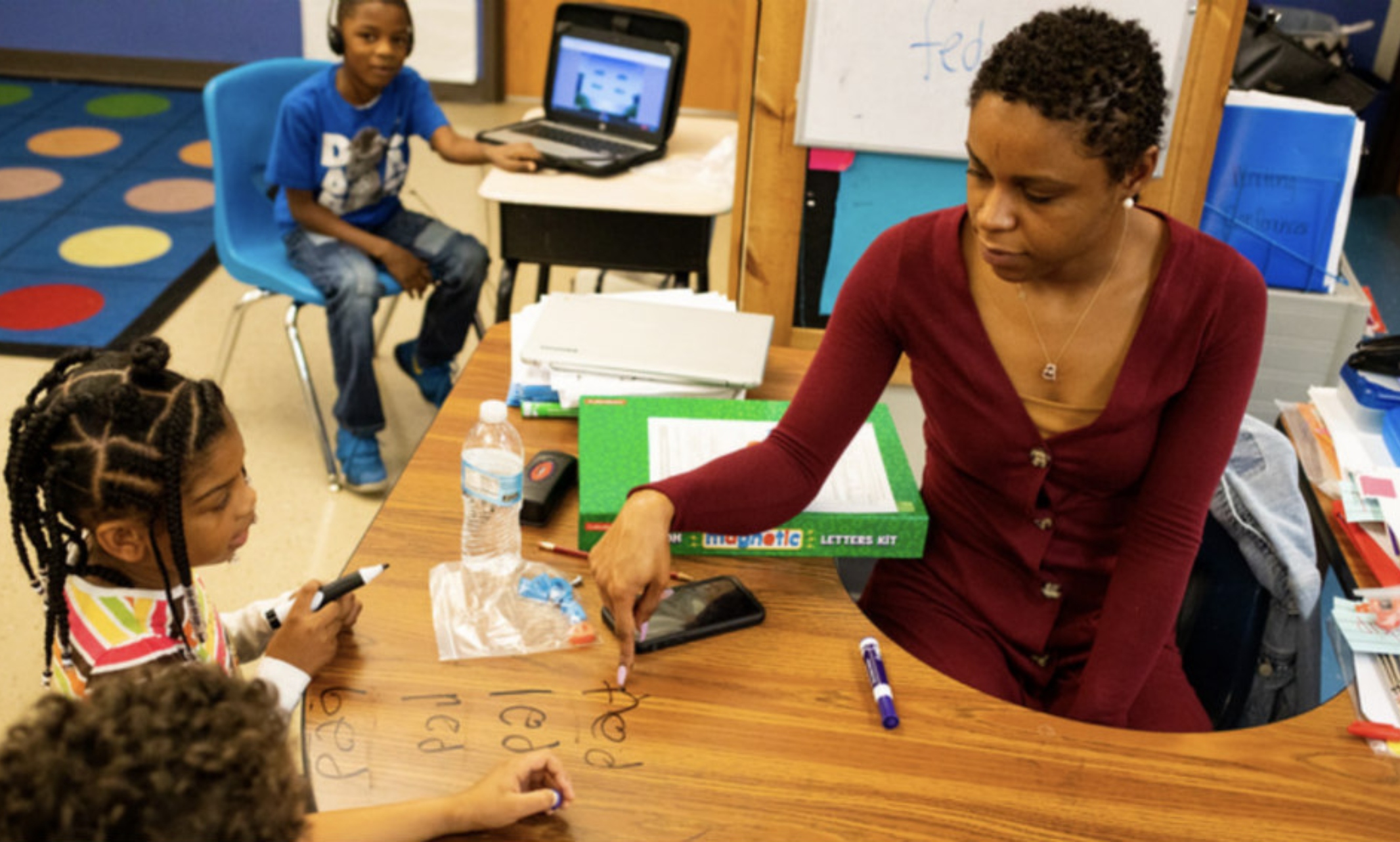
The Institute for Urban Education Grow Your Own program is designed to train teachers to serve the Kansas City area
More than 100 local high school students will be at the University of Missouri-Kansas City School of Education on April 5 as part of the university’s Institute of Urban Education Grow Your Own program.
The IUE Grow Your Own program was founded in 2019 to address teacher shortages, retention and diversity in Kansas City schools. The program is designed for students from urban Kansas City school districts to receive an affordable, supportive college education then return to their home districts as highly qualified, culturally responsive educators. Students begin the program in high school with dual credit and mentorship opportunities to help provide guidance as they explore a career in teaching. Once in college, the program focuses on creating culturally responsive educators focused on relationships with their students and community.It’s a mission that has become even more crucial during the COVID-19 pandemic, which has intensified the pre-existing shortage of educators. According to a December 2021 report from the Missouri Department of Secondary and Elementary Education, the retention rate for teachers after five years was 46.5% in 2021.
Students in the program will spend the full day on campus to present their solutions to issues of educational inequity confronting school communities. The event is from 9:30 a.m.-2 p.m. at the Atterbury Student Success Center located at 5000 Rockhill Road.Current participating high schools in the IUE Grow Your Own program include Center High School, Crossroads Preparatory Academy, DeLaSalle High School, Grandview High School, Guadalupe Centers, Hogan Preparatory Academy High School, Lincoln College Preparatory Academy and Northeast High School.
Apr 04, 2022
